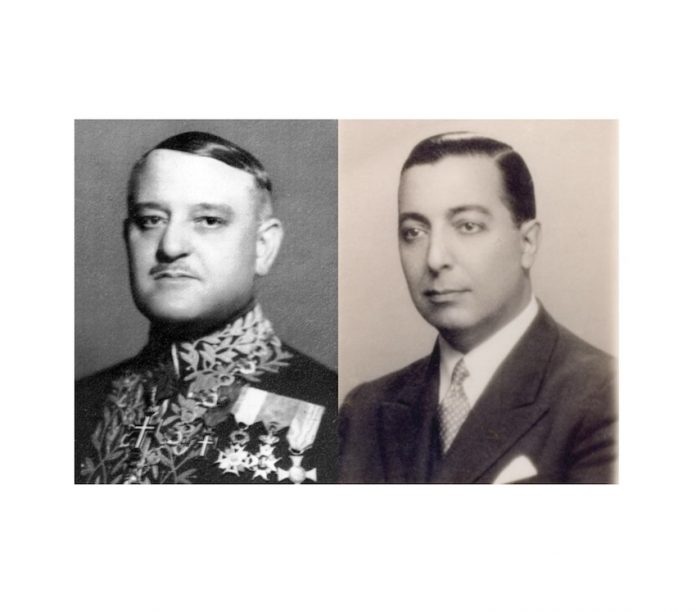“Whoever saves one life saves the world entire” – Talmud
Edited by Anna Popper
16 April 2024 marks the Day of Remembrance for the Hungarian Victims of the Holocaust. On this day in 1944, 80 years ago, the Hungarian administration and police, in collaboration with the Nazi occupiers, began establishing the first ghettos and concentration camps in Hungary. Here, Jews were deprived of their rights, detained under inhumane conditions and subsequently deported to German death camps. Prior to the Nazi occupation of Hungary on 19 March 1944, the Hungarian Jewish community had already suffered from numerous restrictive measures, but their situation took a catastrophic turn with the German invasion.
15 May 1944 marks the beginning of the Hungarian Holocaust, a period of deportations with unparalleled brutality and efficiency of the Nazi genocide. Within just 10 weeks, the SS and their Hungarian collaborators deported 430,000 Hungarian Jews to Auschwitz. This chapter of the Holocaust is particularly harrowing, given that it occurred when the war was nearing its end, and world leaders were already aware of the mass exterminations in the gas chambers.
Amidst this brutality, some brave diplomats refused to stand by in silence. Among them were two Portuguese diplomats: Ambassador Carlos Sampaio Garrido (1883-1960) and Chargé d’Affaires Alberto Teixeira Branquinho (1902-1973). These men, stationed in Budapest, defied orders and risked their own lives to save as many Hungarian Jews as possible. During their diplomatic missions, they played a crucial role in saving thousands of lives during the Holocaust by issuing visas and passports, and providing shelter. These acts of diplomacy by the Portuguese Embassy were instrumental in saving many lives during one of the darkest periods in history.
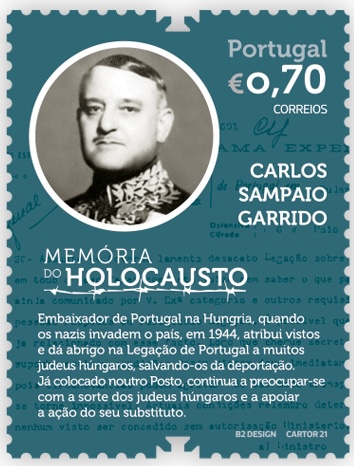
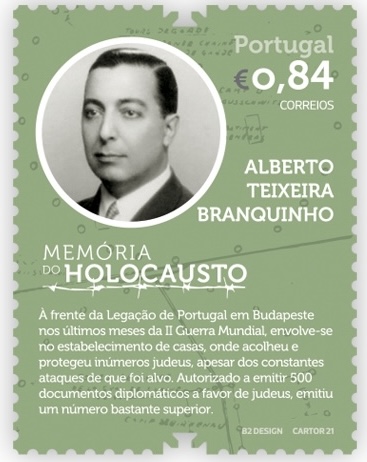
To honour the courage, moral conviction and profound humanism of two Portuguese diplomats, the Ambassador of Portugal to Hungary, H.E. Jorge Roza de Oliveira, along with his spouse, Mrs. Vera Vasconcelos de Abreu, and the Embassy team, organised a day of remembrance and tribute on 1 July 2024 in Galgagyörk and Budapest. The event was graced by the presence of Mr. Salvador Sampaio Garrido Reis, grandson of the late Ambassador Carlos Sampaio Garrido, who travelled to Budapest for this momentous occasion.
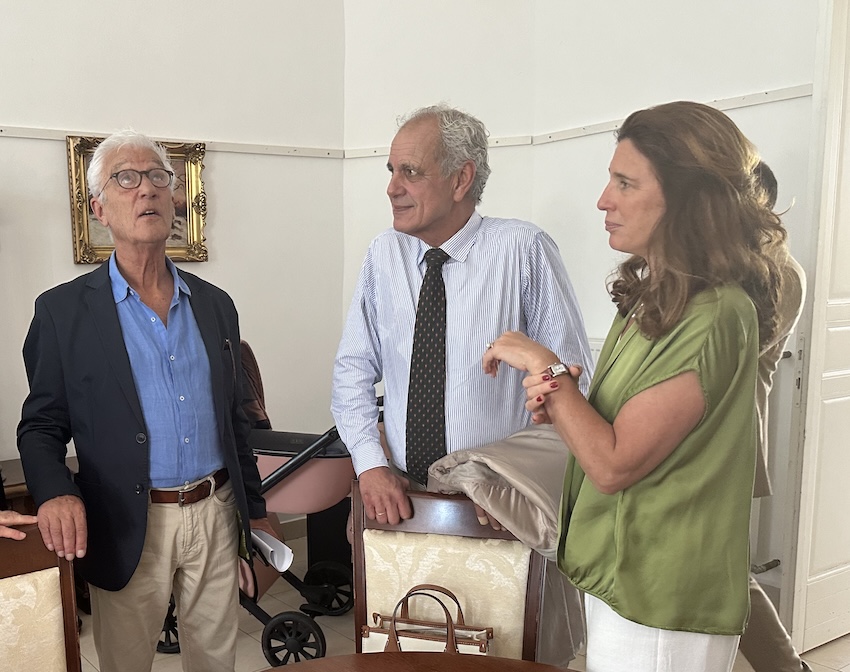
Visit in Galgagyörk
The remembrance began in Galgagyörk, a small village about 60 kilometres from Budapest with a remarkable history linked to these events. The Portuguese delegation was warmly received by the Mayor Ms. Mónika Lami, along with local citizens. She expressed her welcome and gratitude to the Portuguese delegation, and the guests gathered in the Town Hall, the former castle owned by the Tahy family, highlighting the importance of the day’s event.
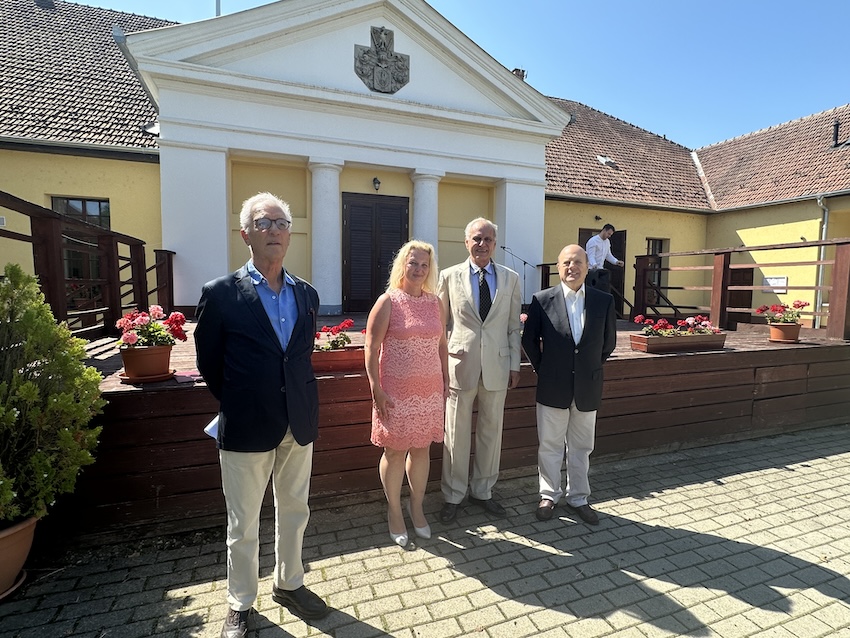
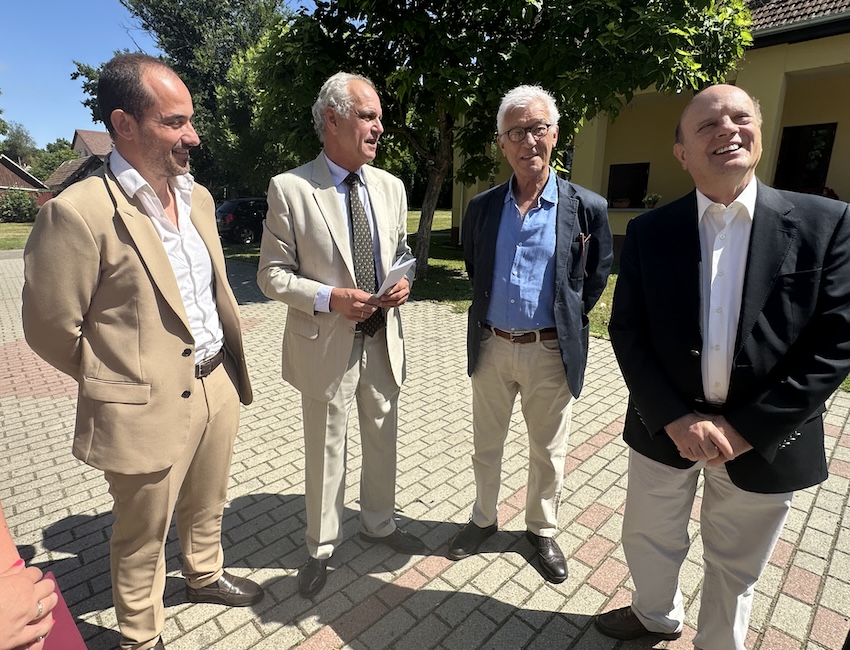
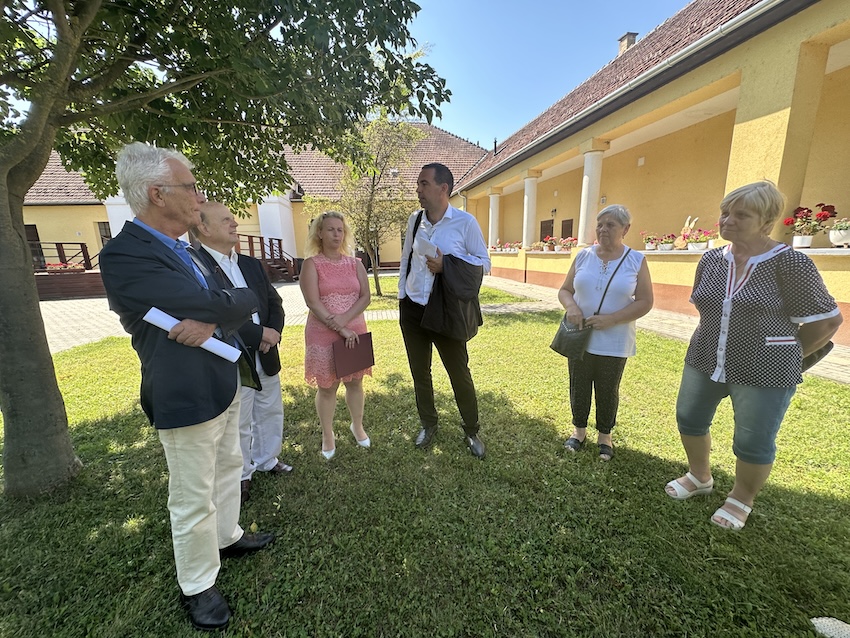
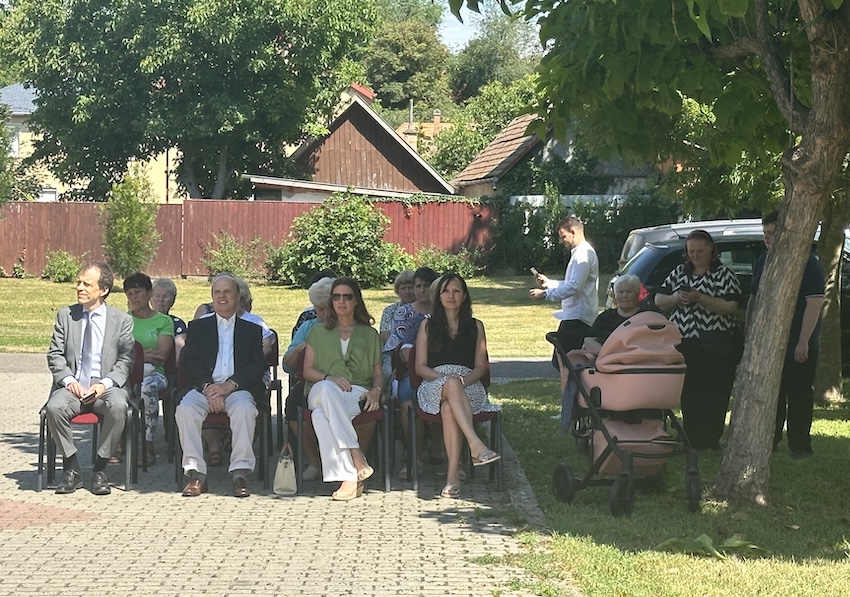
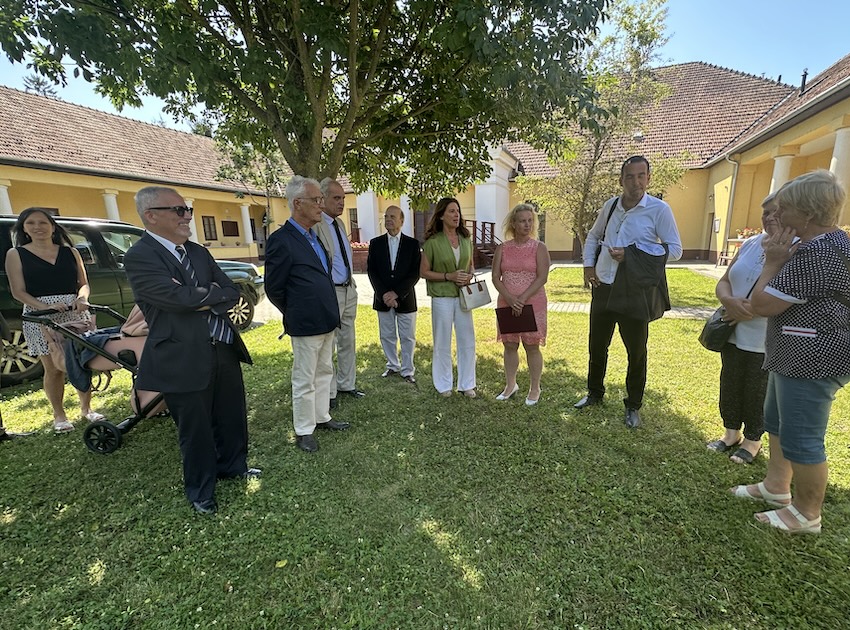
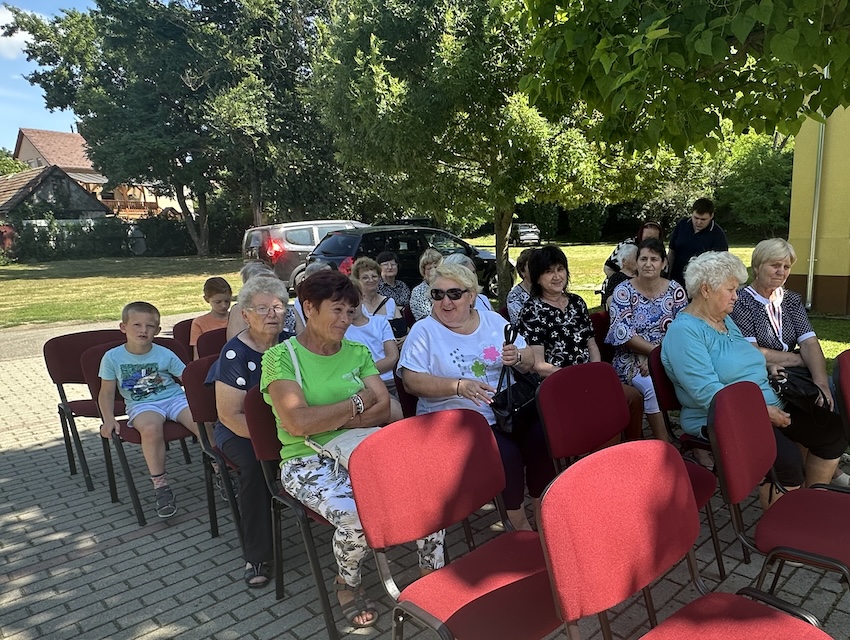
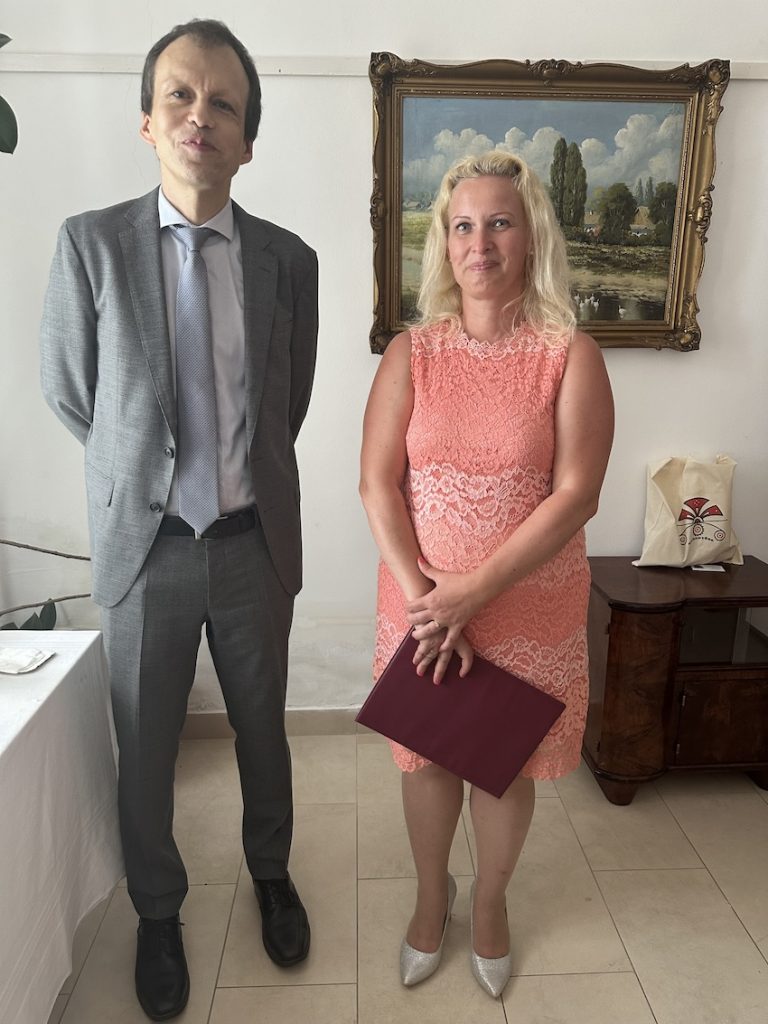
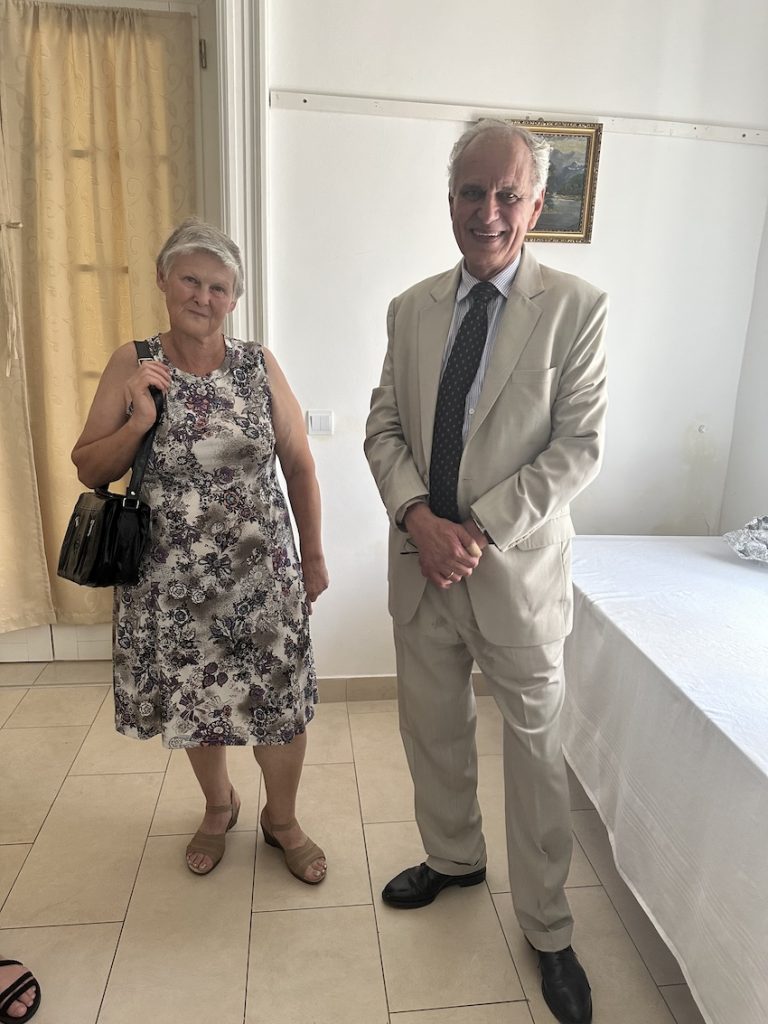
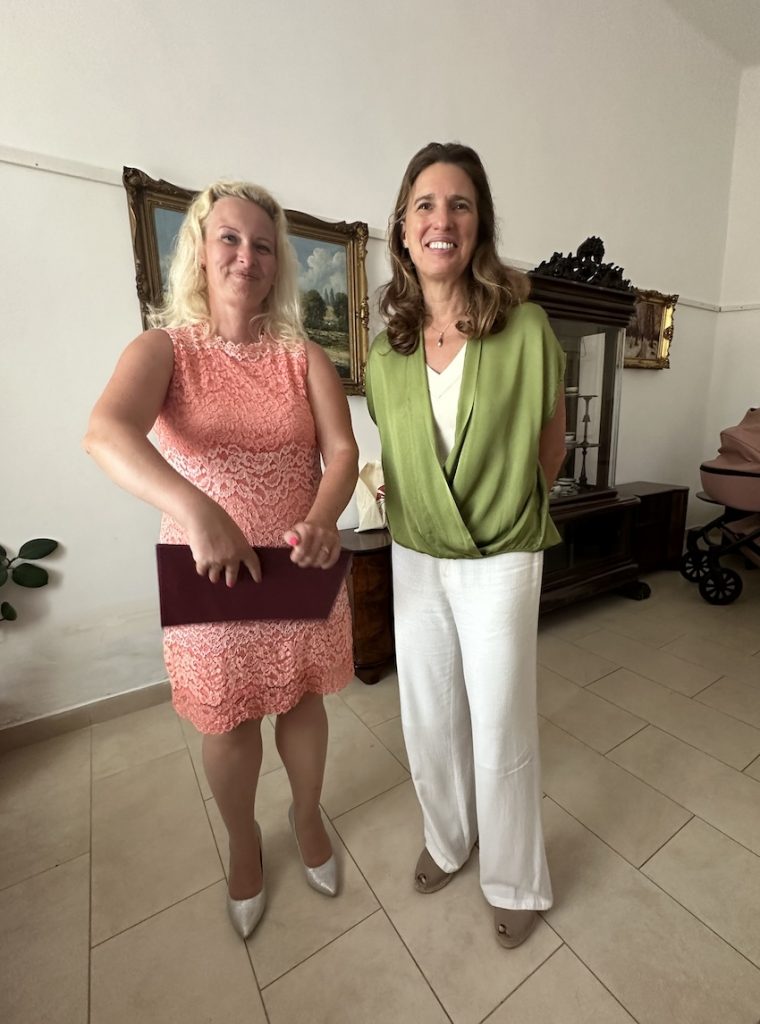
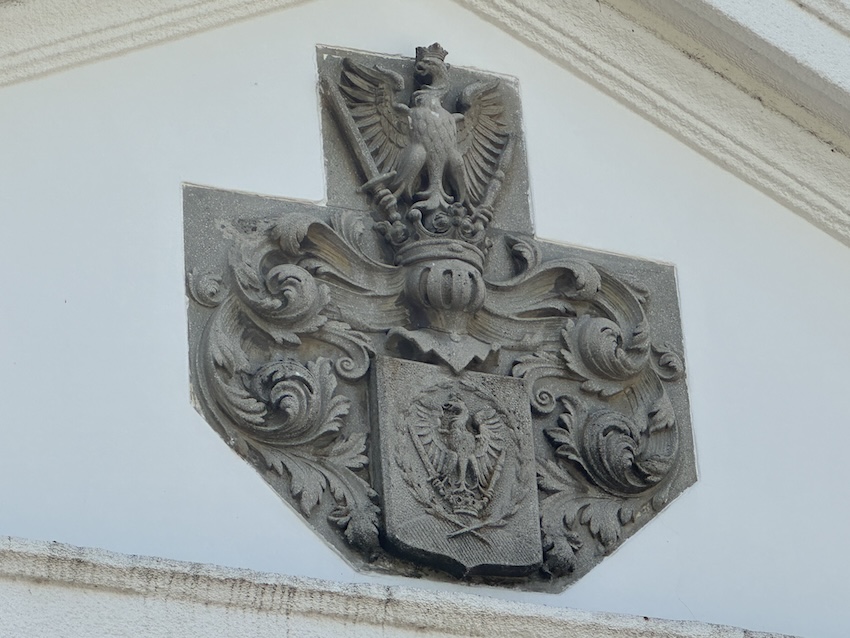
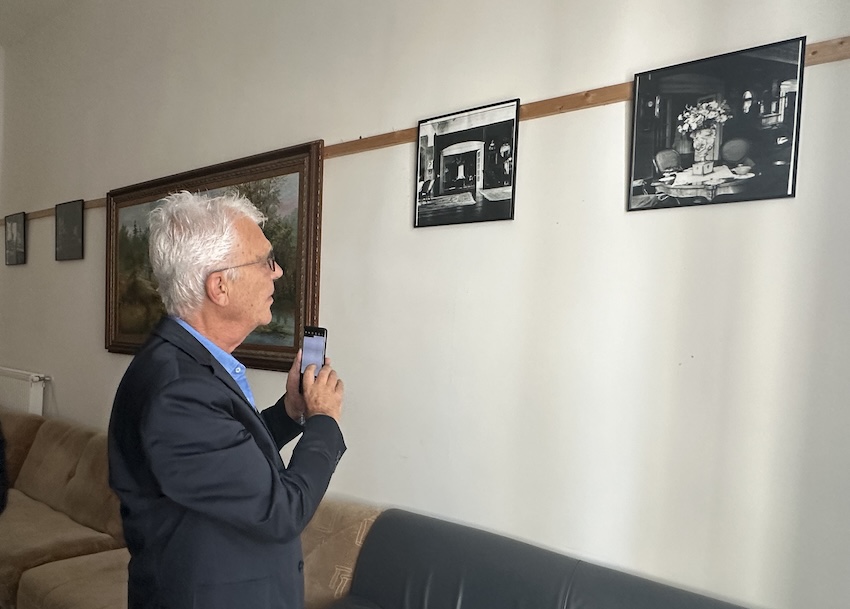
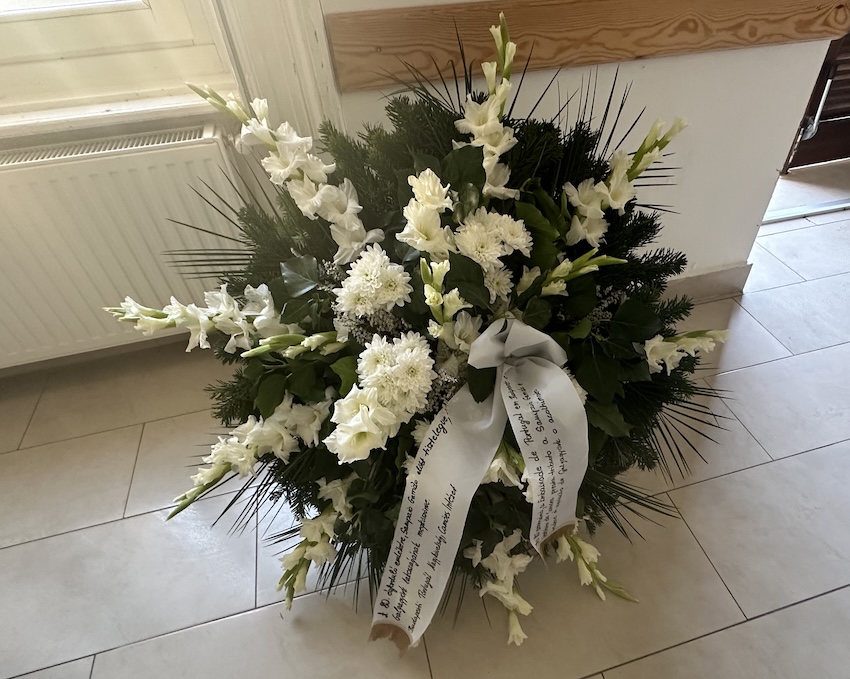
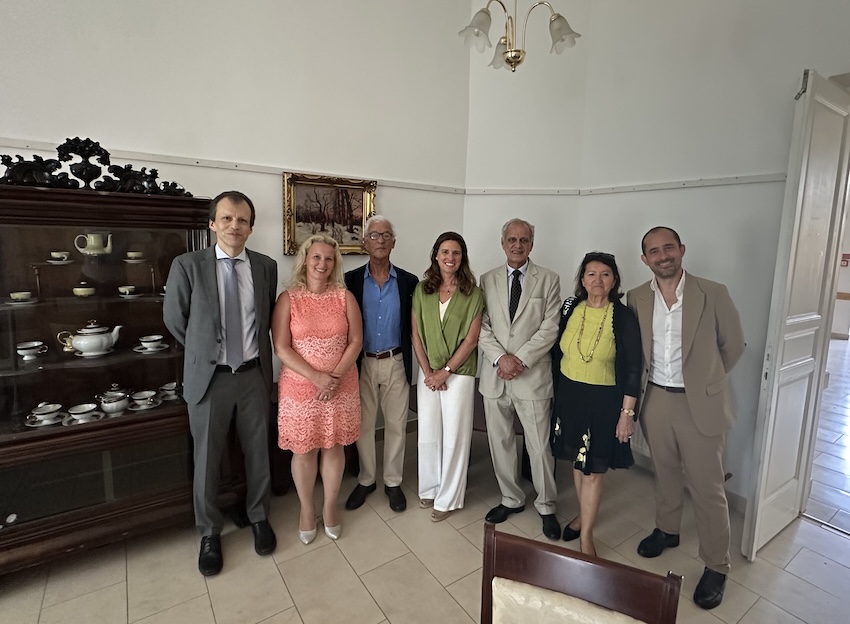
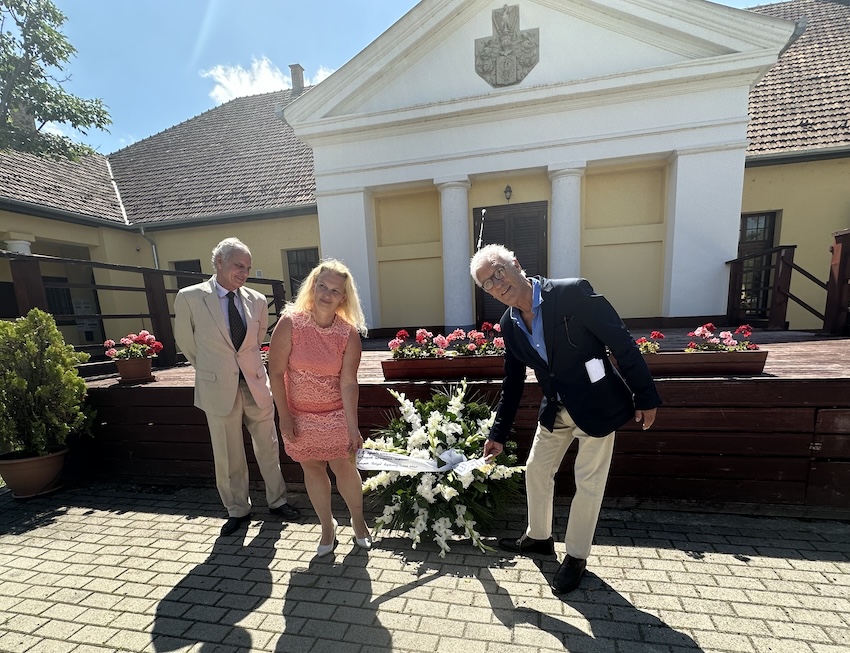
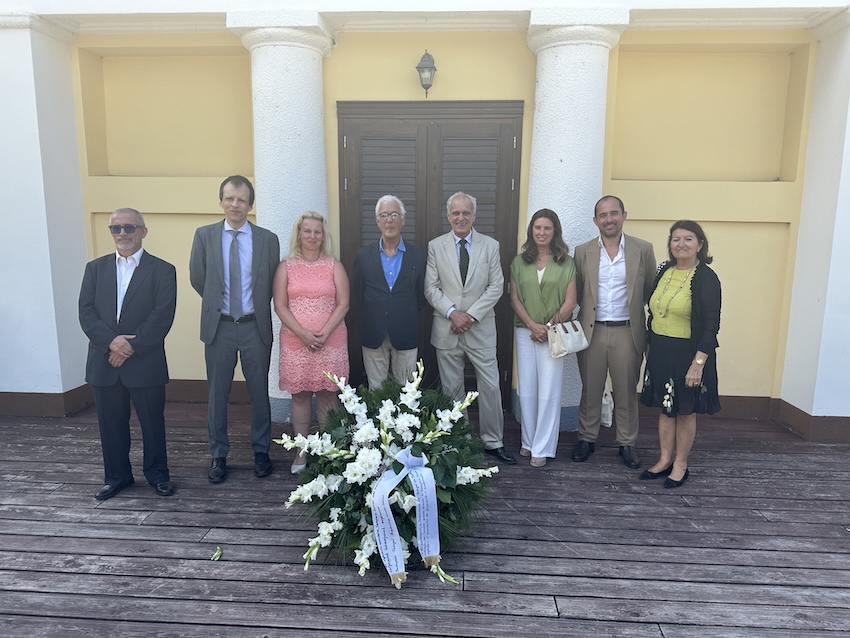
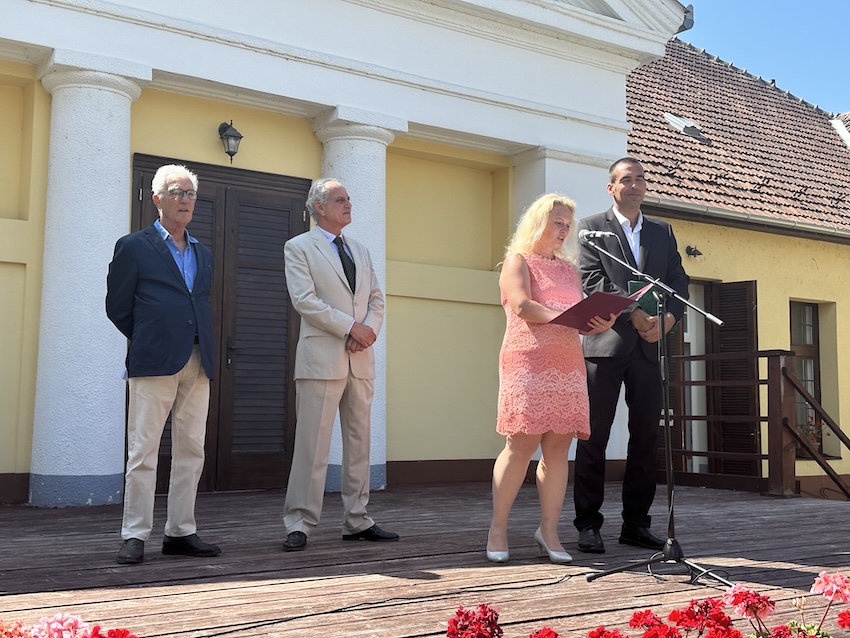
In her speech, the mayor remarked: “We often speak of ‘special occasions’ and today truly embodies this term. A few weeks ago, we received a phone call from the Portuguese Embassy in Budapest informing us that during World War II, the Portuguese Embassy temporarily operated here, and the then Ambassador saved many lives by hiding Jewish people in our village. This commemoration 80 years later is dedicated to that brave act.”
Mayor Lami also emphasized the importance of openness and willingness to help others, values exemplified by the Tahy family, who supported the operation of the embassy during the war: “Their openness, regardless of origin, nationality or religion, was a testament to their humanity. They wanted to help, keep the embassy running and save lives. In today’s world, it is crucial to maintain this spirit of openness and nurture relationships that foster new friendships.”
She concluded with optimism, saying, “I was overjoyed when the ambassador reached out to us. I believe that this meeting marks the beginning of a new friendship between our communities. Thank you all for your attention.”
Ambassador Jorge Roza de Oliveira took the floor, adorned with a wreath of white flowers, radiating an air of solemnity:
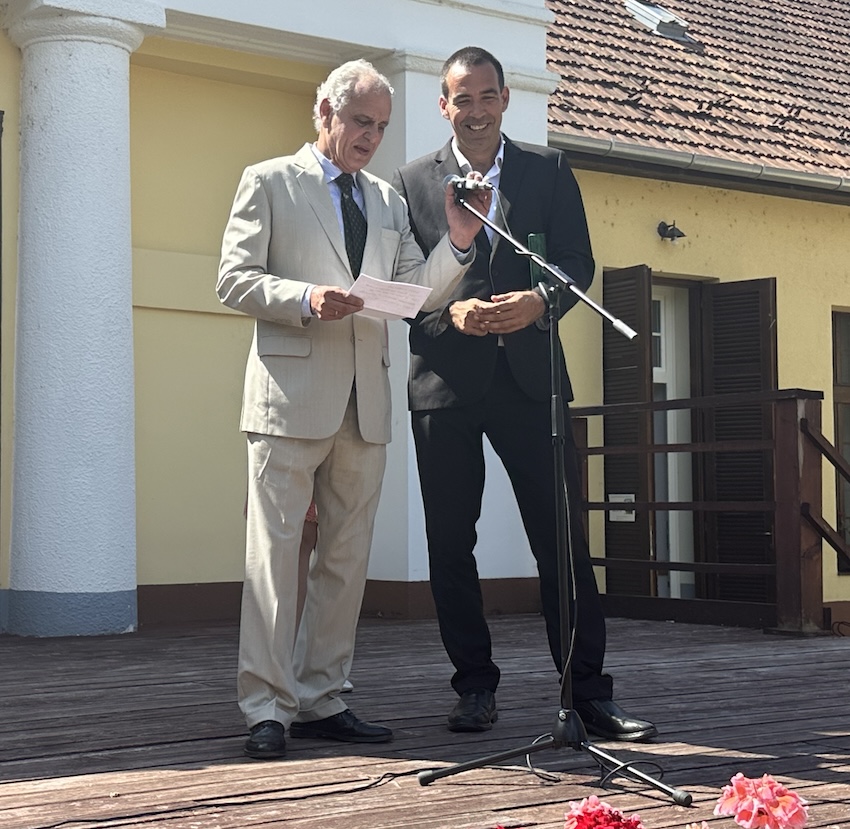
“Distinguished Mayor, Honourable Guests, Ladies and Gentlemen, today, 1st July, marks the midpoint of the year – a day of significance for several reasons. It is the beginning of the Hungarian Presidency of the Council of the European Union, an occasion that we celebrate with hopes for great success. It also marks the 50th anniversary of the renewal of diplomatic relations between Portugal and Hungary after Portugal’s Carnation Revolution in April 1974.
However, we are not gathered here in Galgagyörk today to celebrate, but to commemorate and to pay tribute. We are here to recall the horrors of the Hungarian Holocaust 80 years ago, a tragedy so immense that in just a few months it claimed the lives of nearly half a million Hungarian Jews – two-thirds of the Jewish community that had long been an integral part of this country.
During World War II, Portugal maintained its neutrality. When Nazi troops invaded and occupied Hungary on 19 March 1944, our Embassy was advised to temporarily leave Budapest. Our Ambassador at the time, Carlos Sampaio Garrido, managed to find refuge in this very building, the Tahy family castle. He moved the Embassy here, along with a group of Hungarians fleeing the Nazis. But just a month later, the Hungarian Gestapo arrived, arrested everyone and brought them to Budapest. Ambassador Garrido insisted on accompanying them, and his courageous actions at the police station, where he confronted the Nazis directly, led to the release of all detainees.
We are here in Galgagyörk to pay tribute to Ambassador Carlos Sampaio Garrido, a man of extraordinary courage and conviction. Today we are honoured to have with us his grandson, Salvador Sampaio Garrido Reis, who dedicated his life to preserving and honouring his grandfather’s legacy.
Due to his vocal defence of the Jewish community, Ambassador Garrido was ordered by the Hungarian government to leave the country. Posted to Bern, Switzerland, he continued to give instructions to his deputy in Budapest. Together, they managed to save hundreds of Hungarian Jews, ensuring their safe passage to Lisbon and from there to freedom.
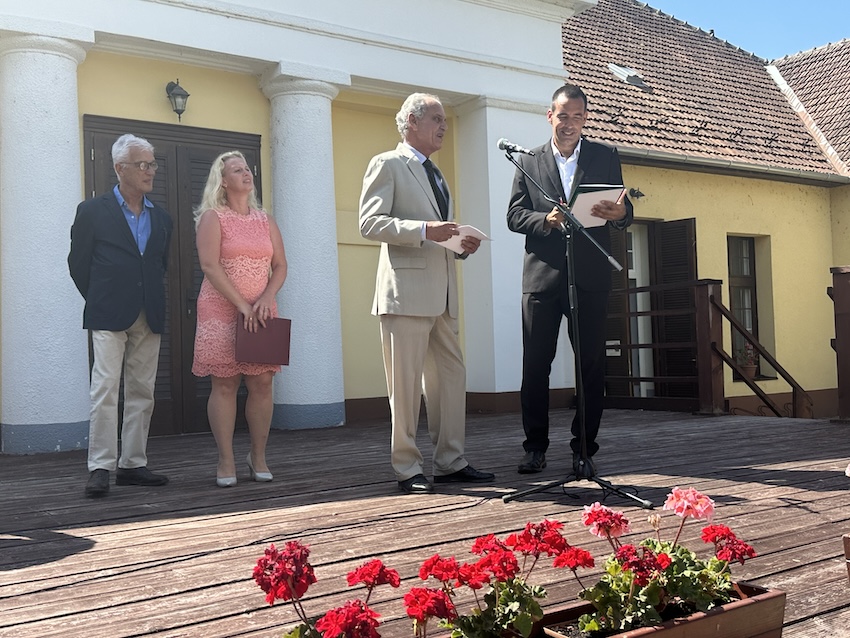
What our diplomats – and diplomats from other nations – did was nothing short of heroic. Diplomacy in those days was not about lunches, receptions, or meetings. The SS and the Gestapo were a daily reality, roaming the streets, and Adolf Eichmann – infamously described by Hannah Arendt as the embodiment of the ‘banality of evil’ – arrived in Budapest. Soon, four trains a day carried victims from Hungary to Auschwitz.
It is with the utmost humility that I stand before you today to honour and pay tribute to my former colleagues, Carlos Sampaio Garrido and Alberto Teixeira Branquinho. Their bravery, their willingness to face danger without fear, and their steadfast commitment to doing what was right – even at great personal risk – are not lessons taught in diplomatic academies. Their deeds were born from a unique and noble character, one that puts others before self, forsaking personal privileges in the face of danger. With this unyielding sense of duty they continue to be remembered with deep respect and admiration.
Dear Mayor, I extend my sincere thanks to you and to the residents of Galgagyörk for hosting us today. We wish you all happiness and success in the years to come.”
Following the moving tribute the audience had just heard, Salvador Sampaio Garrido Reis shared his heartfelt words in memory of his grandfather, Ambassador Carlos Sampaio Garrido:
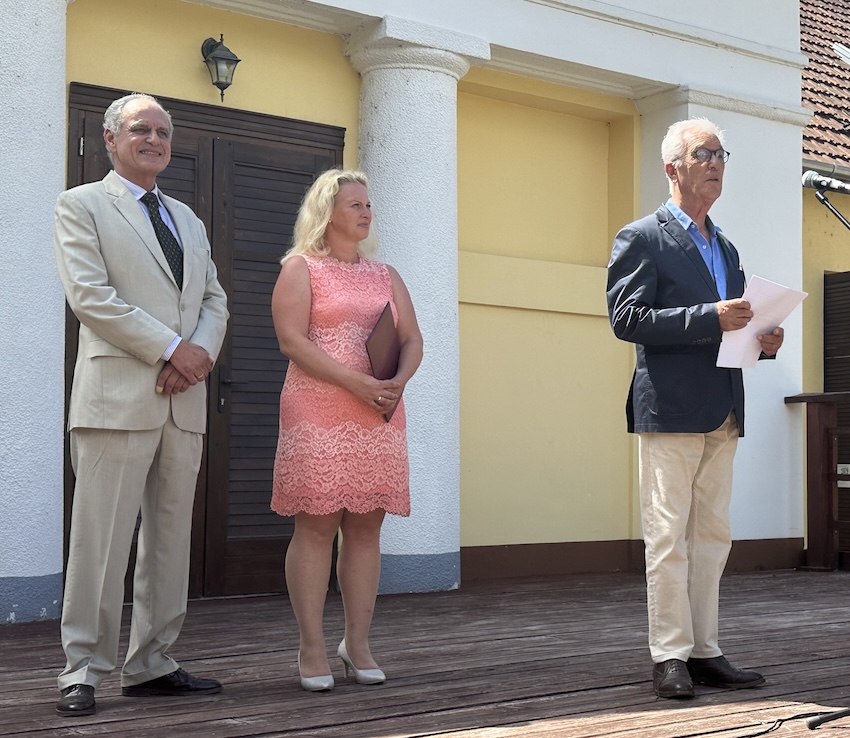
“Ladies and Gentlemen, it is with great honour that I stand before you today, as a grandson, in this symbolic place, representing the family of the former Portuguese Ambassador to Hungary, Carlos Sampaio Garrido.
I would like to begin by expressing my deepest gratitude to the current Portuguese Ambassador, Dr. Jorge Oliveira, and to everyone who contributed to this tribute. I am also indebted to Dr Éva Bán for her academic work that brought to the world’s attention the achievements of the Portuguese diplomats in Hungary during that period, through her research on the Lisbon–Budapest–Berlin triangle. My thanks also go to Dr András Gulyás, the former Hungarian Ambassador to Portugal between 1991-1996, who was the first to recognize and honour these diplomats for their actions in 1994.
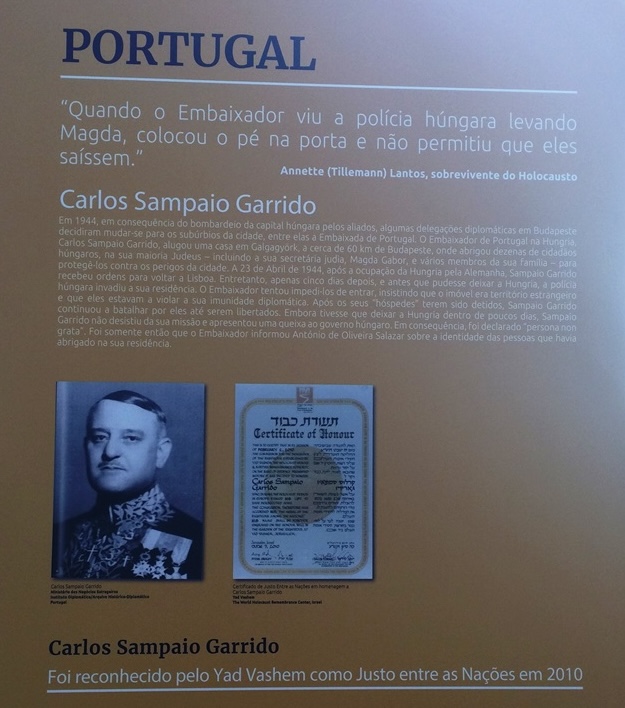
As Portuguese Ambassador in Budapest, my grandfather Sampaio Garrido faced the heart-breaking reality that people in Hungary were persecuted, desperate to flee to neutral countries or the United States to survive. Using Portugal as a bridge, and in collaboration with Teixeira Branquinho, he issued as many visas as possible to help people escape the horrors that were closing in on them.
Throughout European history and beyond, we find examples of humanists who became known and revered for their decisive choices and actions – decisions that have endured as examples and references for the world. In our fast-paced, immediate world, it is crucial to reflect on the collective memory of societies and to hold onto timeless values. We must teach these values to those who come after us, continually reminding them of the importance of what it means being truly human.
Eight decades after the end of the WWII, we remember those who held relevant positions and influence in society at the time and who chose to act with humanistic ethics, addressing the urgent needs of the moment and rising above the constraints of their professional roles.
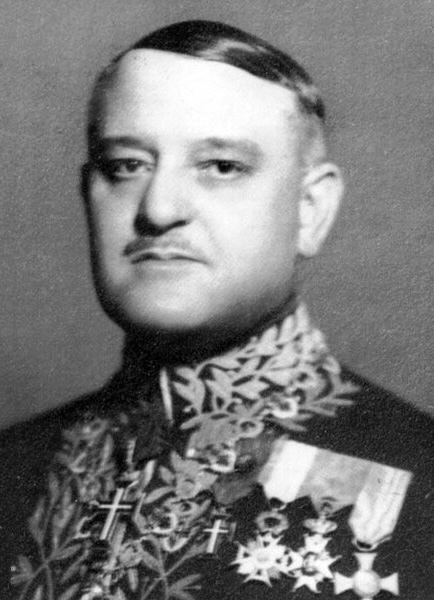
In July 1939, Sampaio Garrido was appointed Envoy Extraordinary and Minister Plenipotentiary in Budapest. As the threat of war grew closer, he gradually became aware of the atrocities that were likely to occur. He reported his concerns to the Portuguese Ministry of Foreign Affairs, but received no concrete responses to his requests.
In March 1944, when German troops occupied Hungary and installed a puppet government headed by Döme Sztójay, the persecution of Jews intensified – properties were confiscated, the yellow star became mandatory and ghettos were established. With Budapest under Allied bombardment, Sampaio Garrido relocated his official residence to Galgagyörk in March, taking with him around 30 people seeking refuge.
On 28 April 28 at 5 a.m., the Hungarian political police invaded the residence. The guests were arrested and taken to the central police station in Budapest. My grandfather insisted on being arrested as well, so that he could continue to help his guests. Unfazed by the violent attacks he endured – attacks that left scars he bore for the rest of his life – he courageously resisted the police and demanded the release of those detained, citing the concept of extraterritoriality of the ambassador’s residence.
Later that month, in response to a request from the Allies to reduce the level of diplomatic representation in Budapest, and with tensions mounting due to his defiance of the Hungarian authorities, Prime Minister Salazar ordered him to return to Portugal. He was replaced by Chargé d’Affaires Teixeira Branquinho. Sampaio Garrido departed for Lisbon on 5 June via Bern, Switzerland. He remained there for some time, continuing to guide his successor Teixeira Branquinho in his efforts to save as many Jews as possible by sending him lists of names and requesting assistance and asylum at the Portuguese Embassy.

In constant contact with Sampaio Garrido, Teixeira Branquinho obtained Salazar’s authorization to grant Portuguese passports to Hungarian Jews, provided they had familial, cultural, or economic ties with Portugal or Brazil (a country diplomatically represented by Portugal). The result of their efforts was the issuance of around 1,000 protection documents, including 700 provisional passports that did not confer Portuguese nationality, as required by Salazar, to prevent future claims to it.
Among those helped by Sampaio Garrido were members of the renowned Zsa Zsa Gábor family and other Hungarian Jewish families. Even as he faced the consequences of his actions – consequences that damaged his diplomatic career – he remained driven by deeply rooted humanist values. These are the values we must remember and honour. Let us continue to reflect on these compassionate examples, these precious acts of soul-centred individuals who, in the context of war, chose to resonate with their hearts and to act in favour of LIFE itself. Today, let us embrace our human nature and act with unconditional compassion.
No Portuguese government, neither before nor after the Carnation Revolution of 25 April 1974, has taken the initiative to honour or publicize the humanistic actions of these two diplomats.
However, in 2010, Carlos Sampaio Garrido was posthumously honoured as “Righteous Among the Nations” by Yad Vashem, the Israeli authority in Jerusalem dedicated to the memory of the martyrs and heroes of the Holocaust. Remember Not to Forget!”
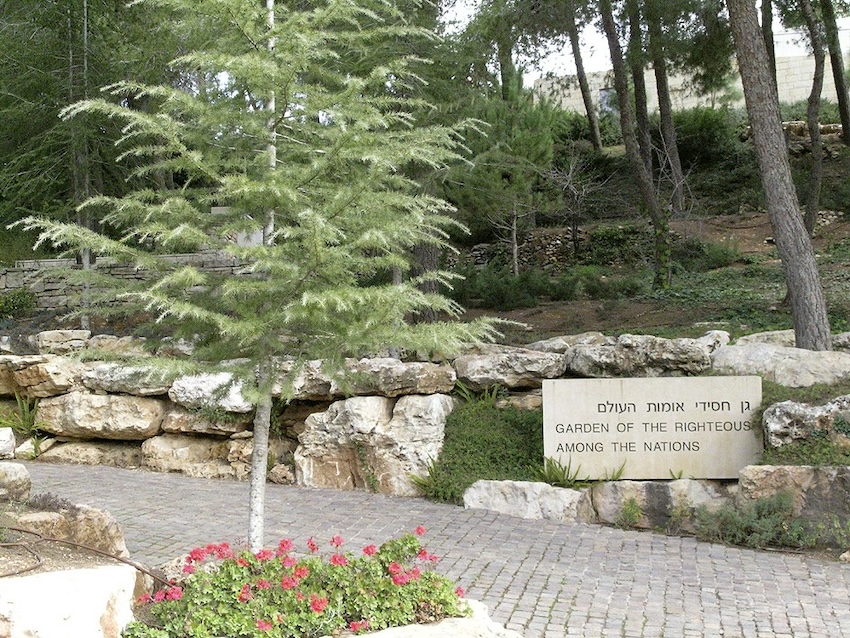
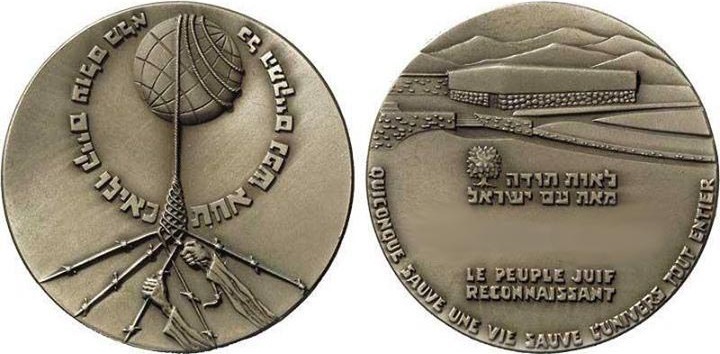
Commemorations in Budapest
The day of remembrance and tribute continued at the InterContinental Hotel Budapest, situated on the banks of the Danube River. The event, organised by the Embassy of Portugal, was attended by leaders from MAZSIHISZ, the Federation of Hungarian Jewish Communities, along with members of the diplomatic corps, and many guests and friends of Portugal.
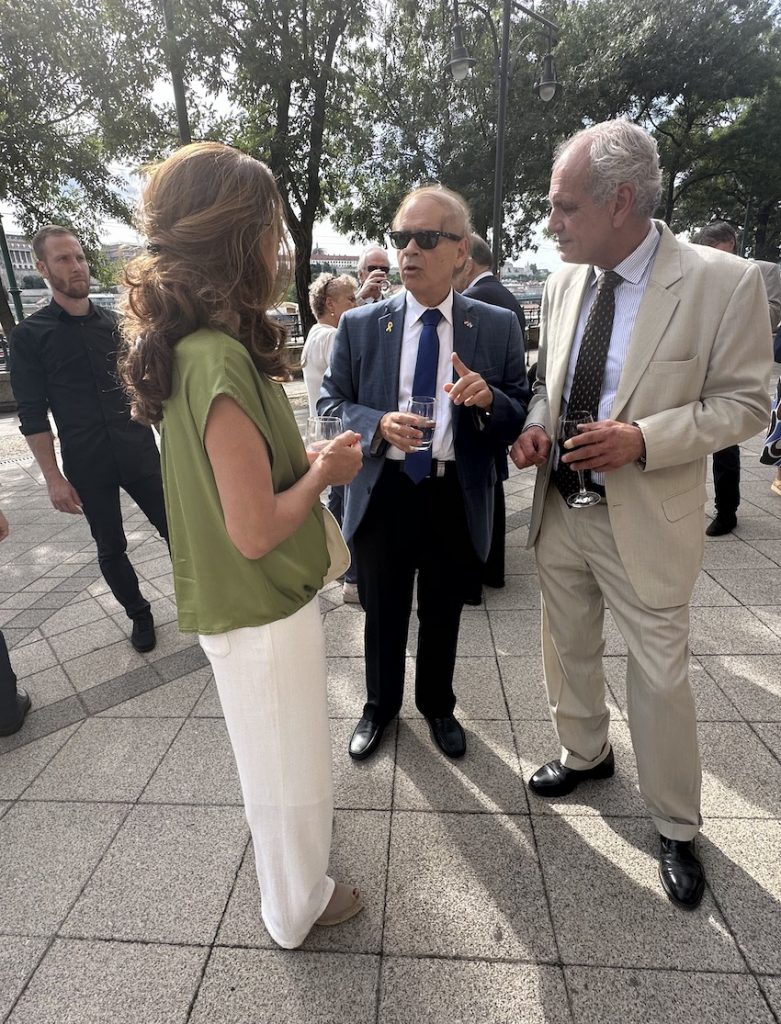
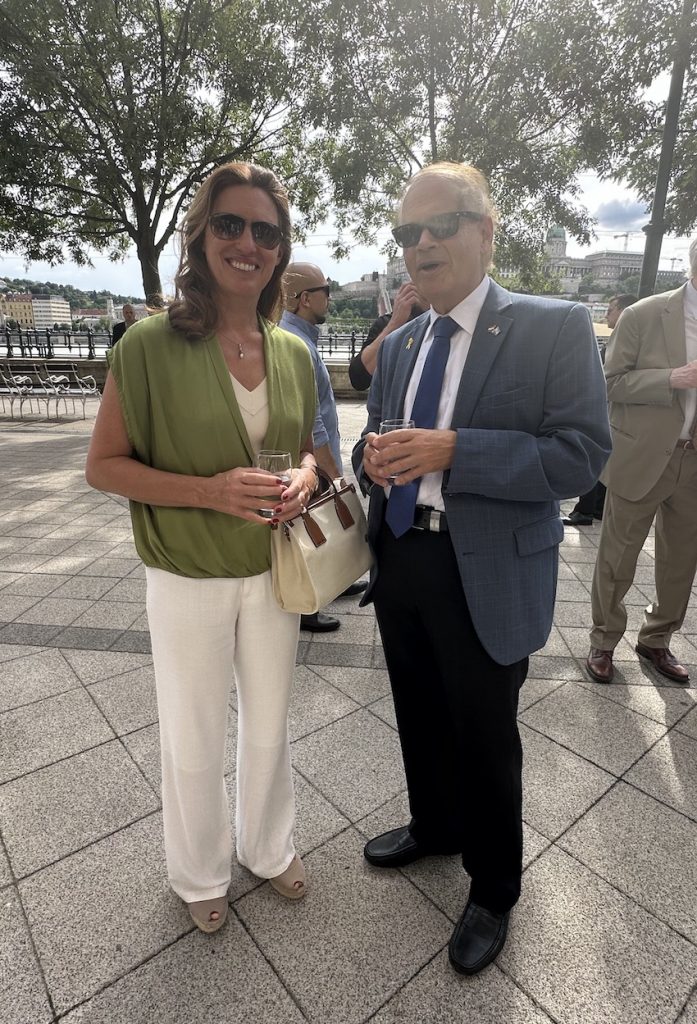
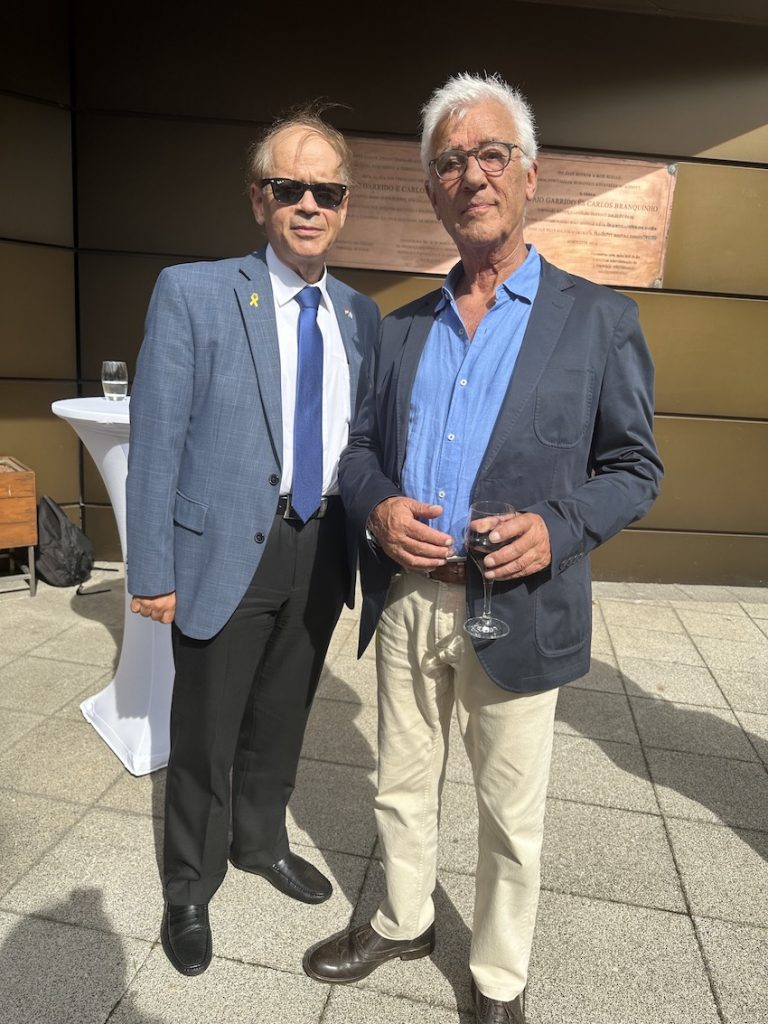
H.E. Yacov Hadas-Handelsman, the Ambassador of Israel to Hungary, also paid tribute at the commemoration honouring the Portuguese diplomats, whose legacy of humanity stands as a role model for all mankind and will forever be remembered.
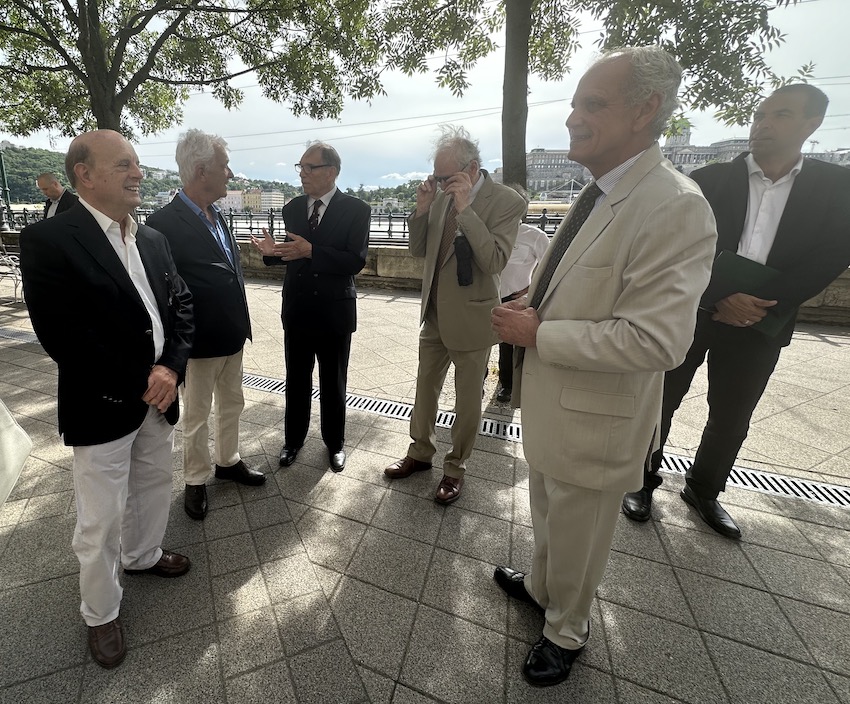
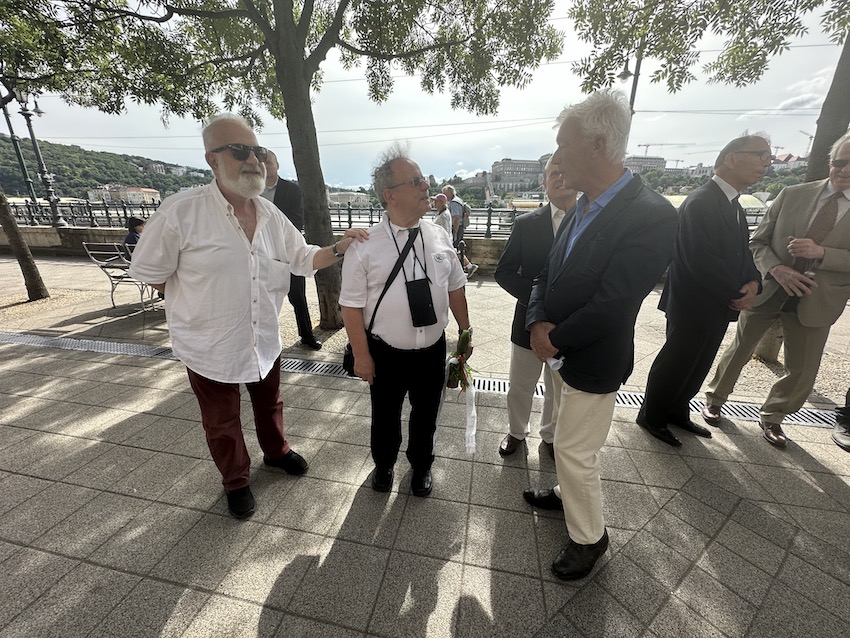
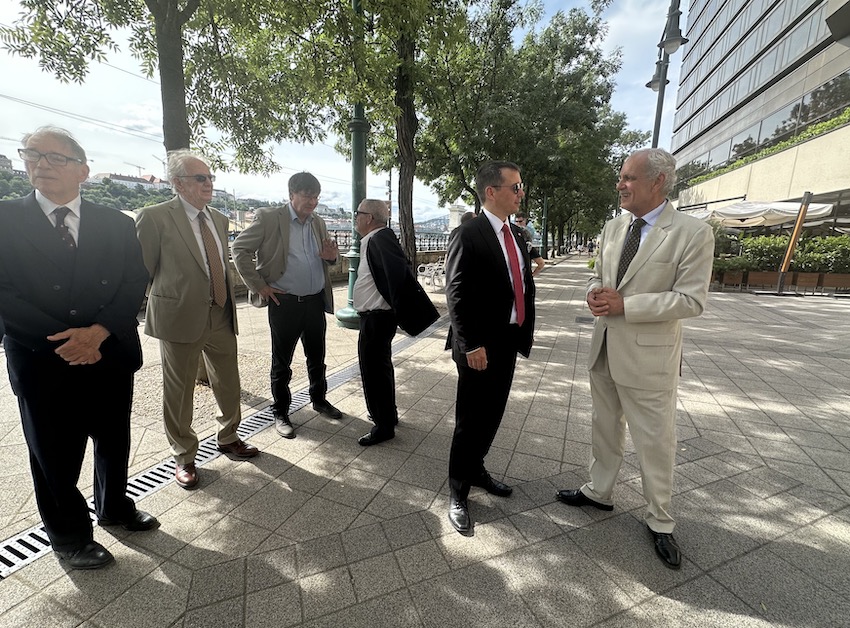
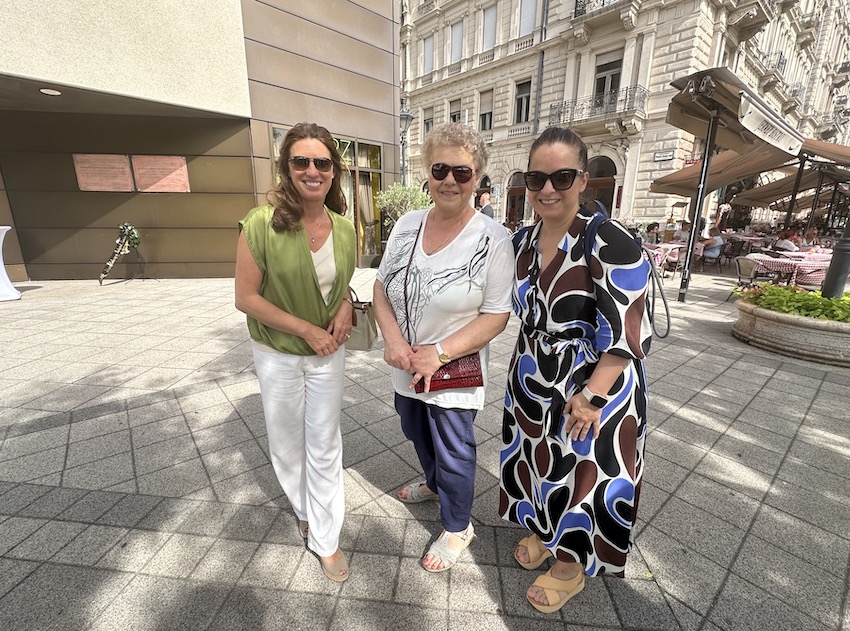
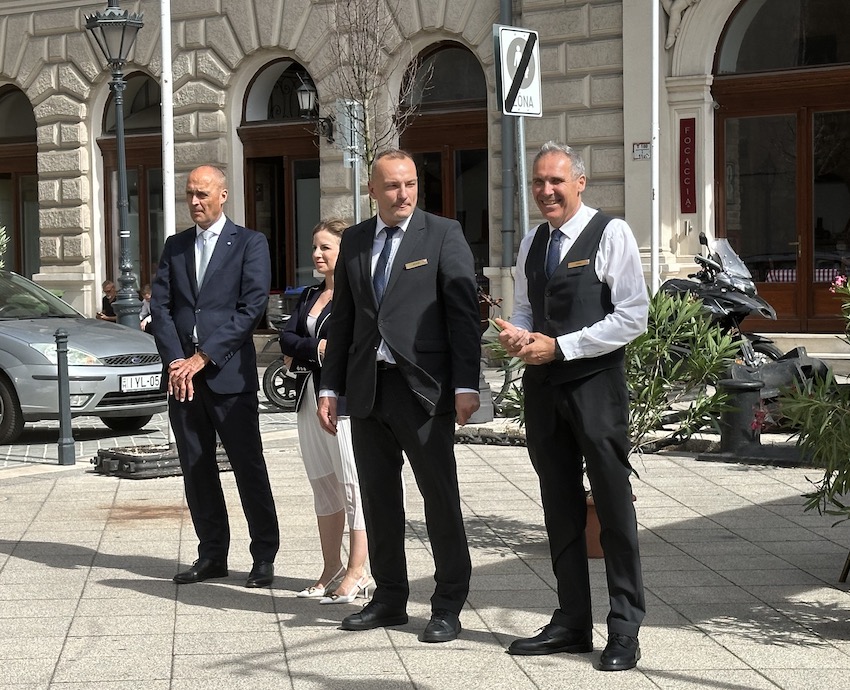
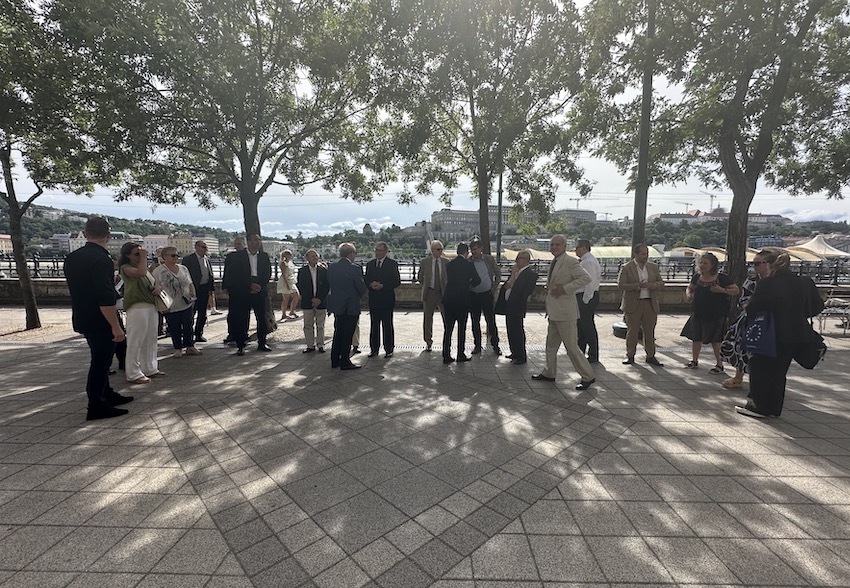
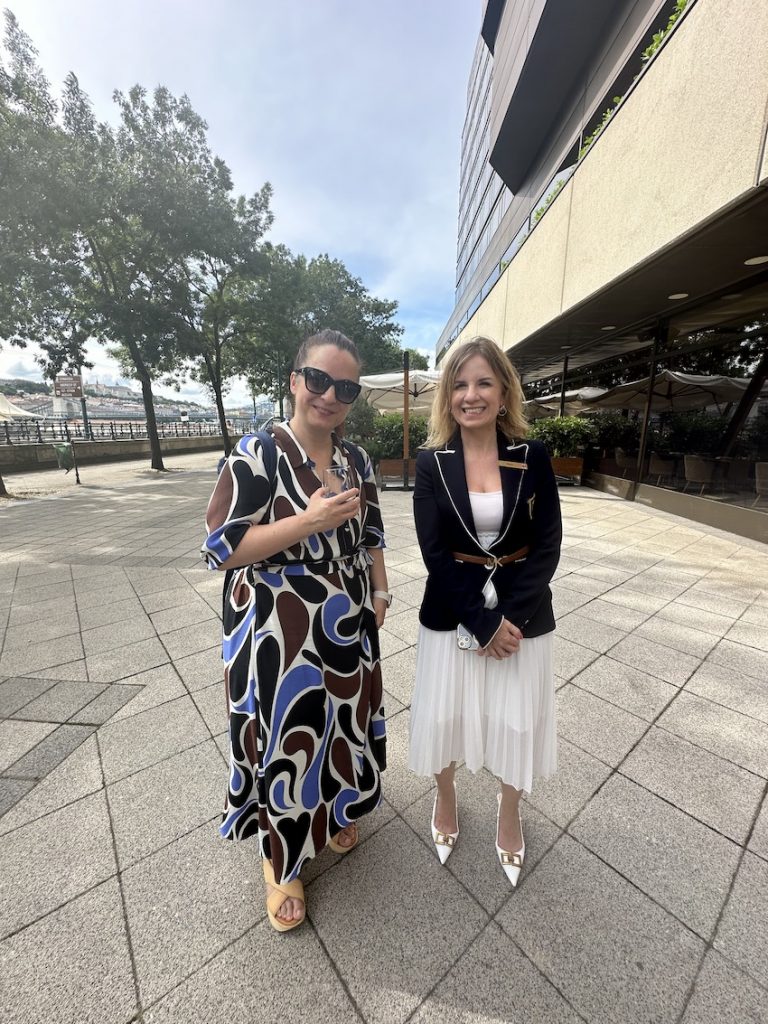
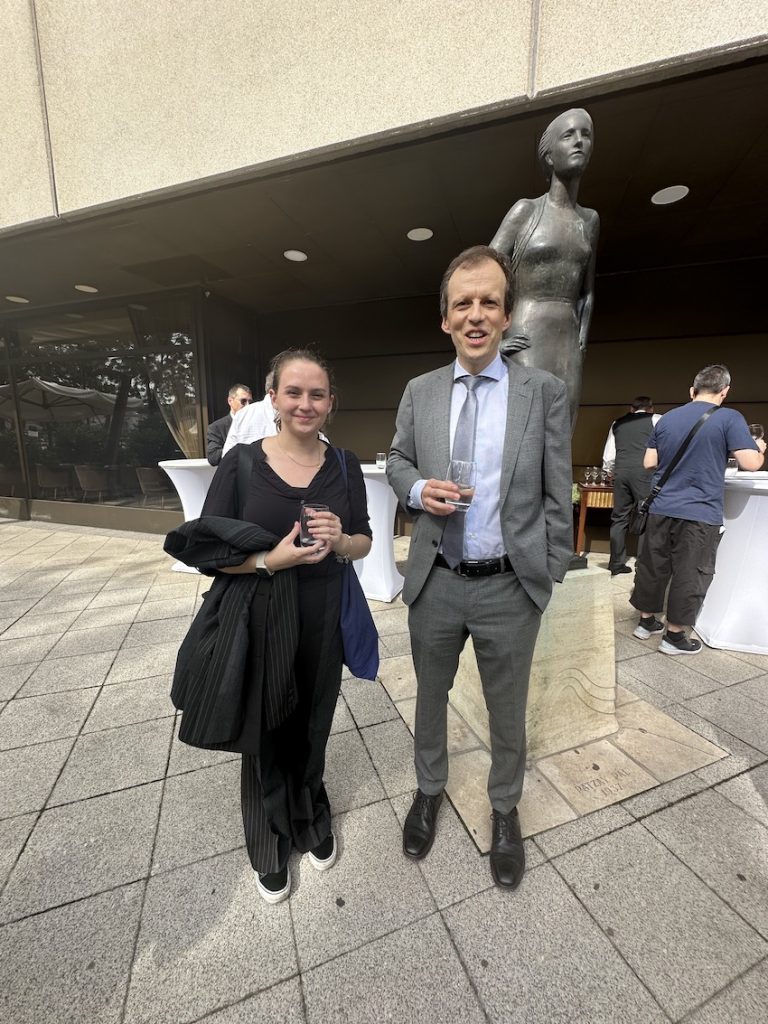
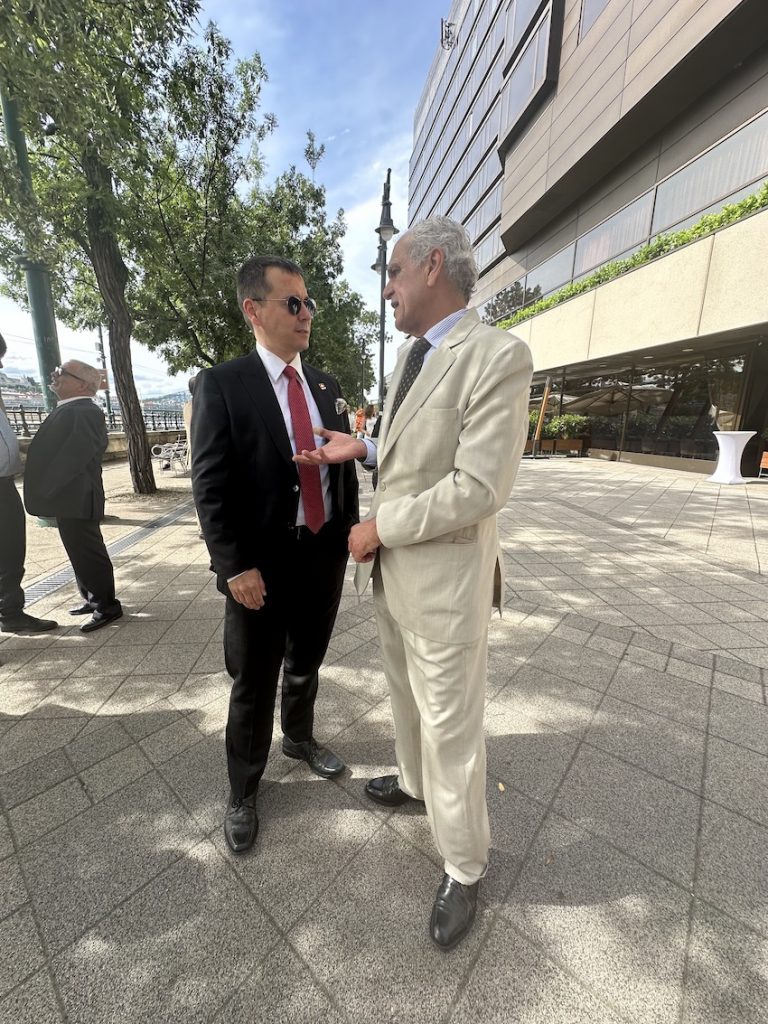
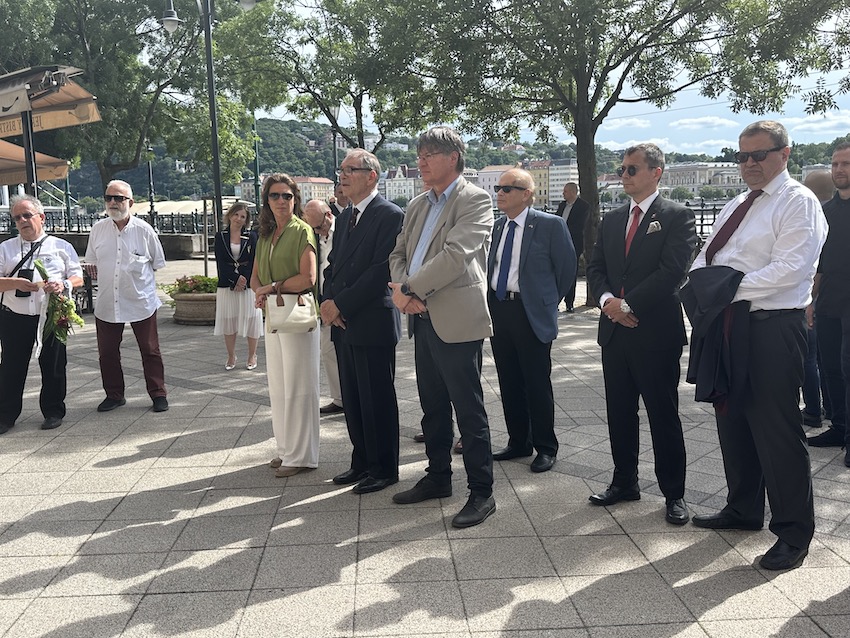
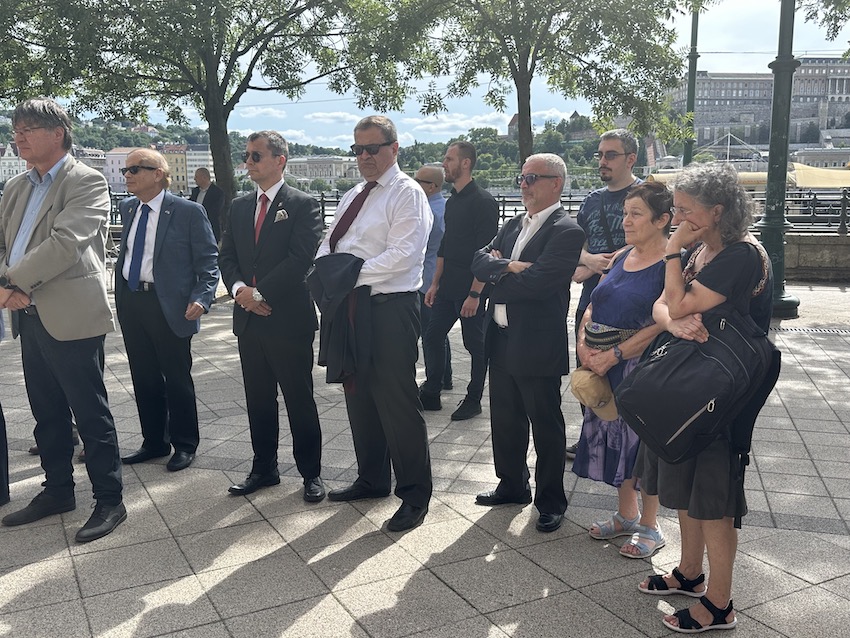
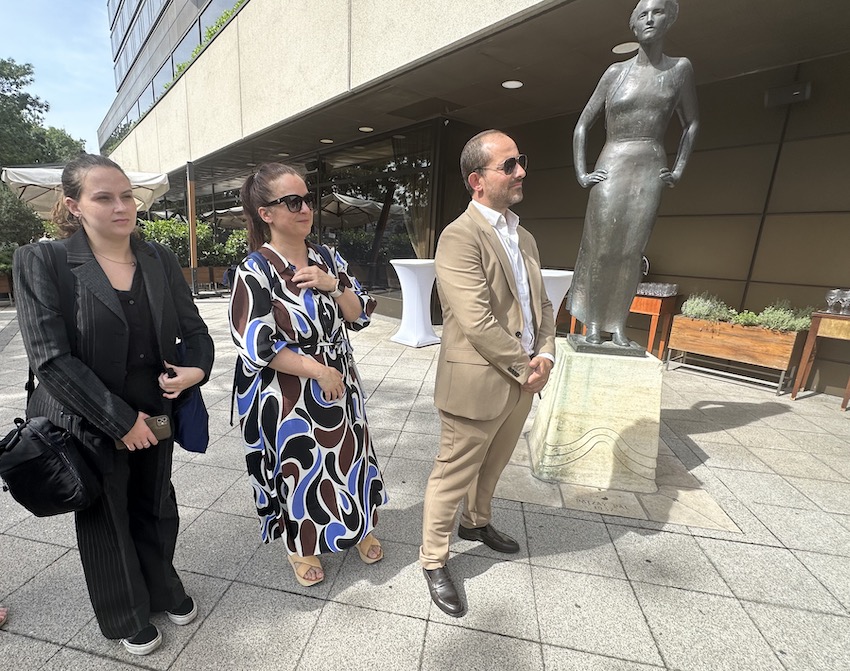
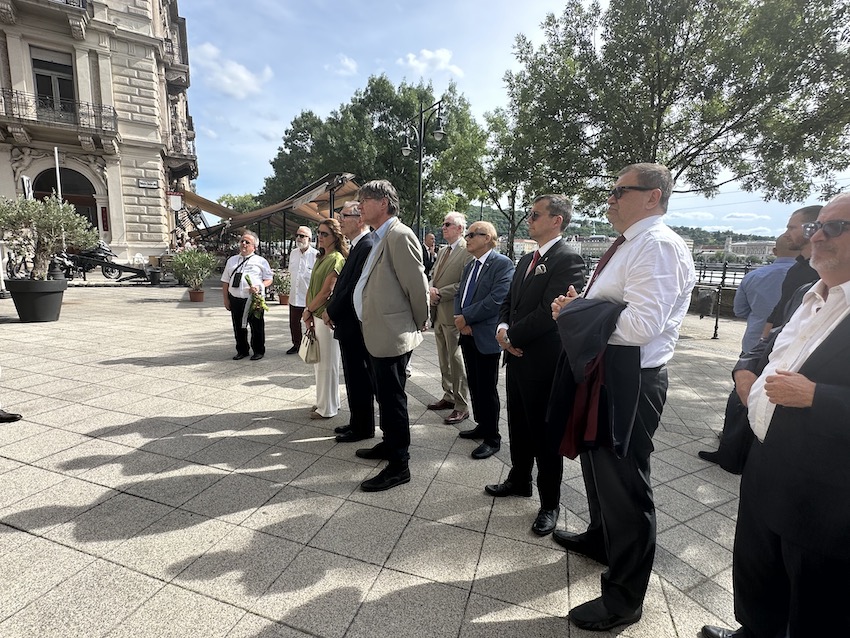
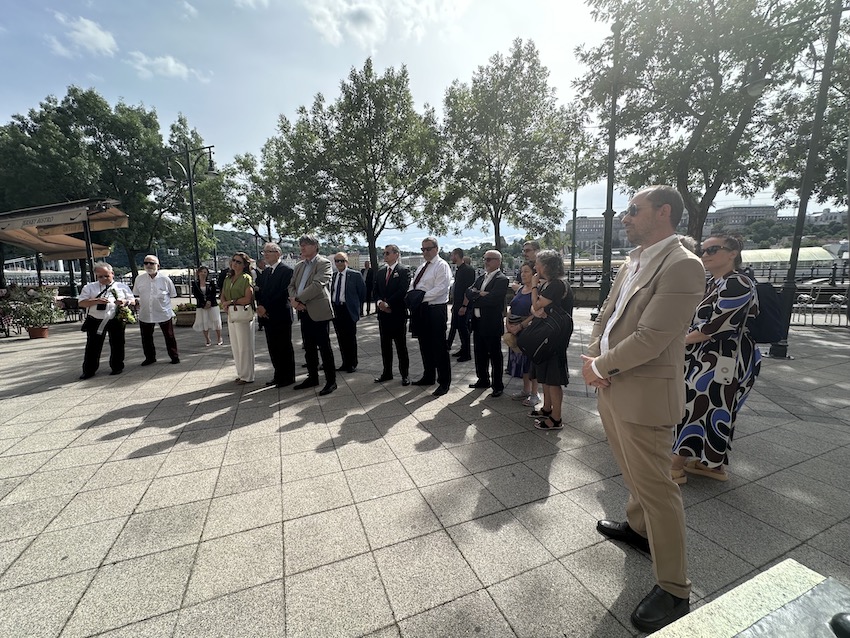
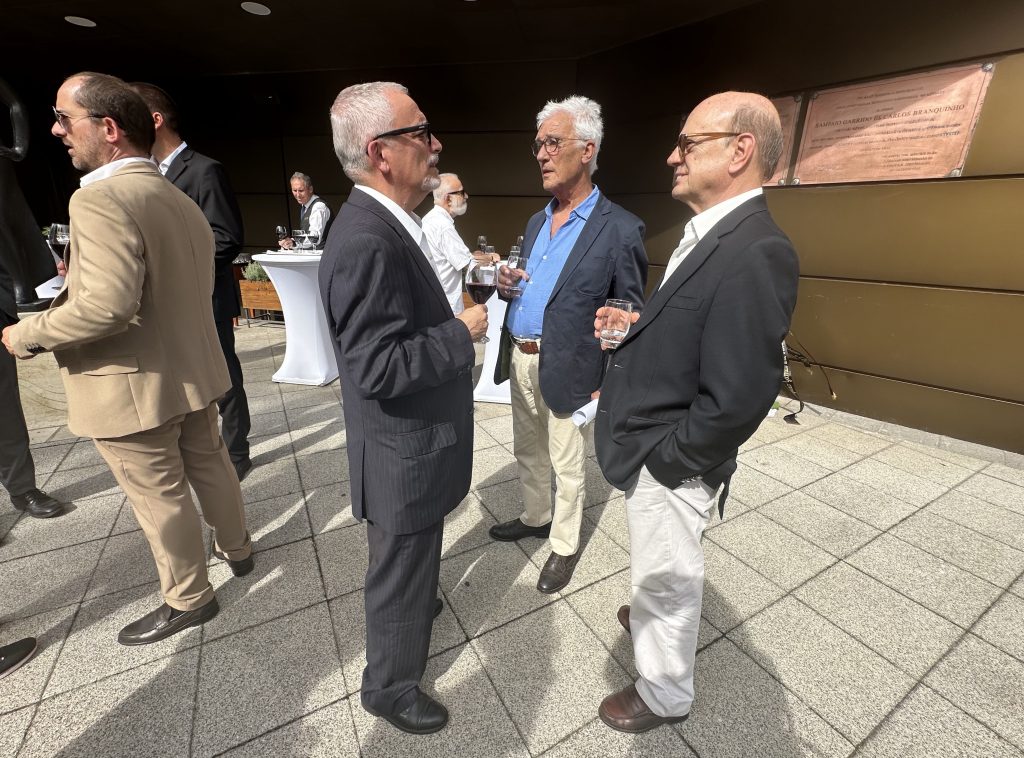
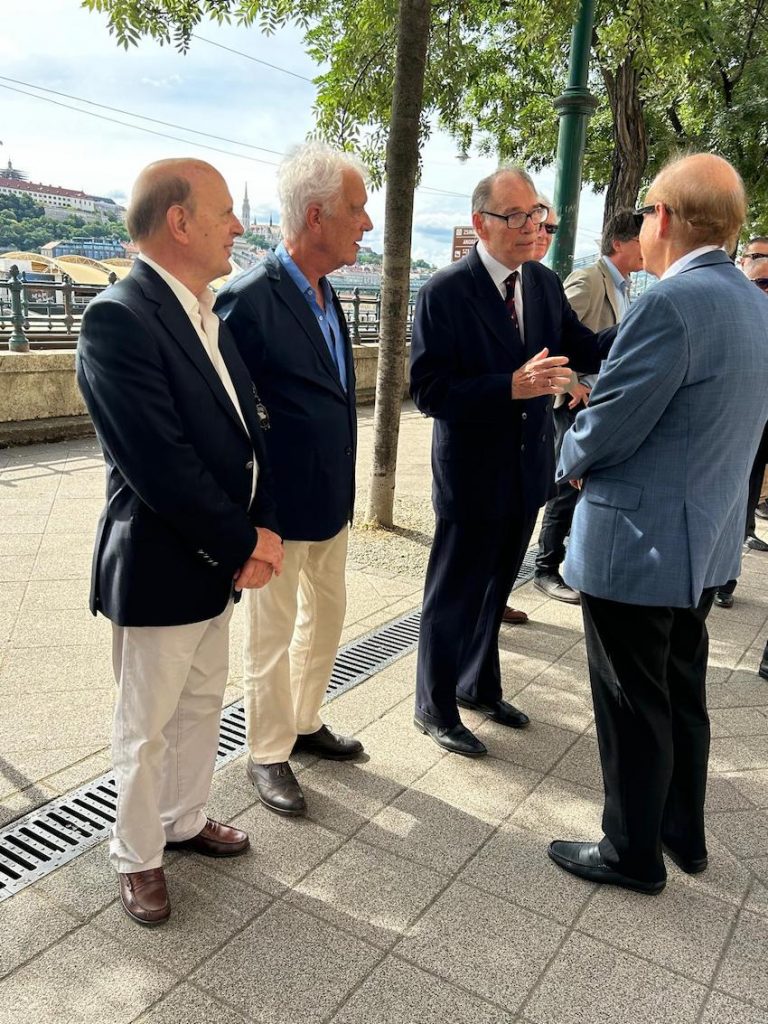
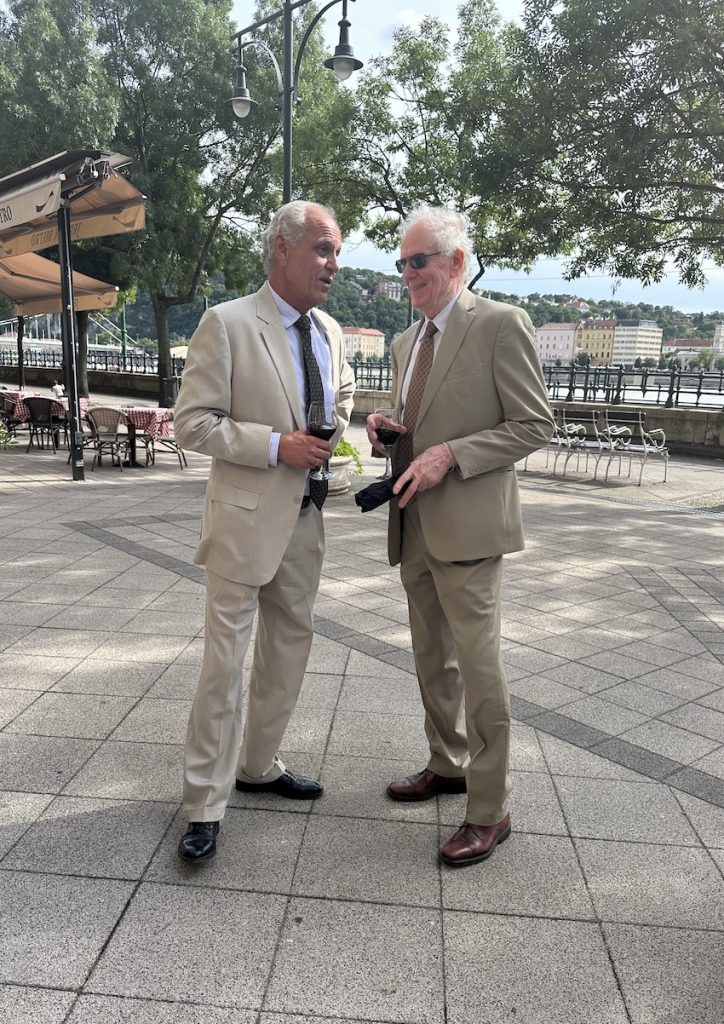
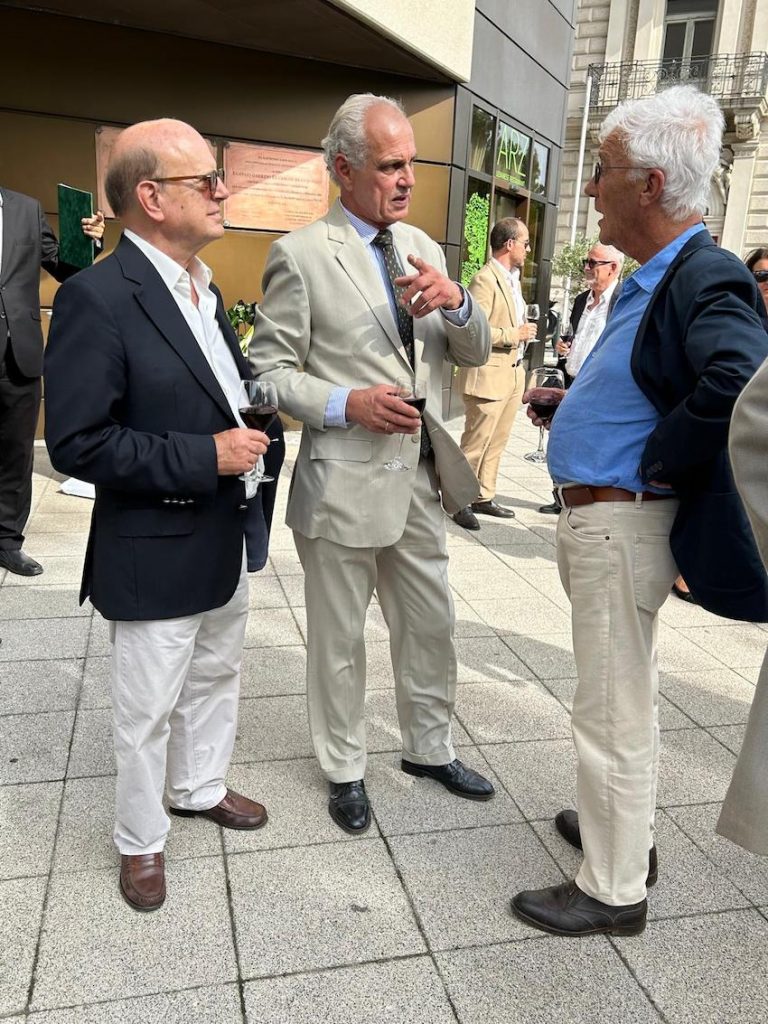
Attendees gathered at a memorial plaque on the hotel’s wall to pay tribute to the Portuguese diplomats, by laying flowers.
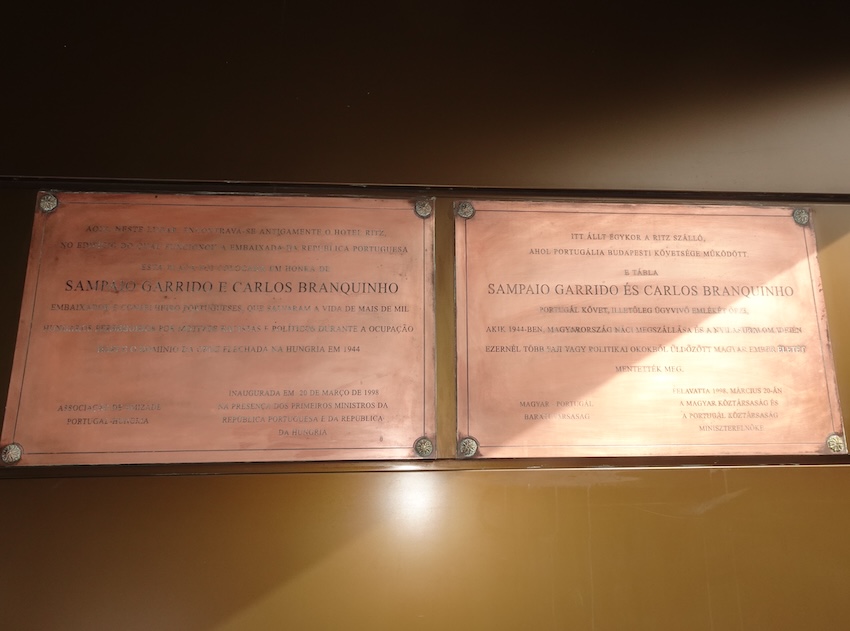
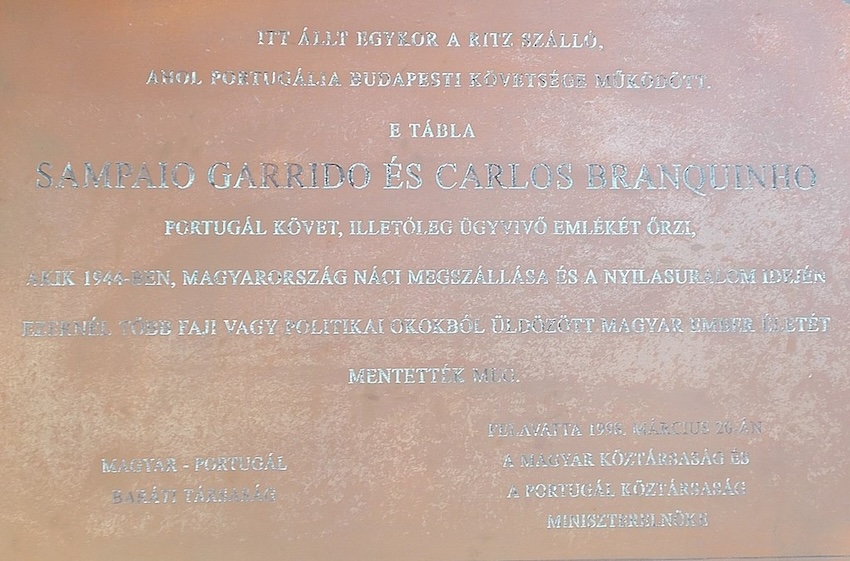
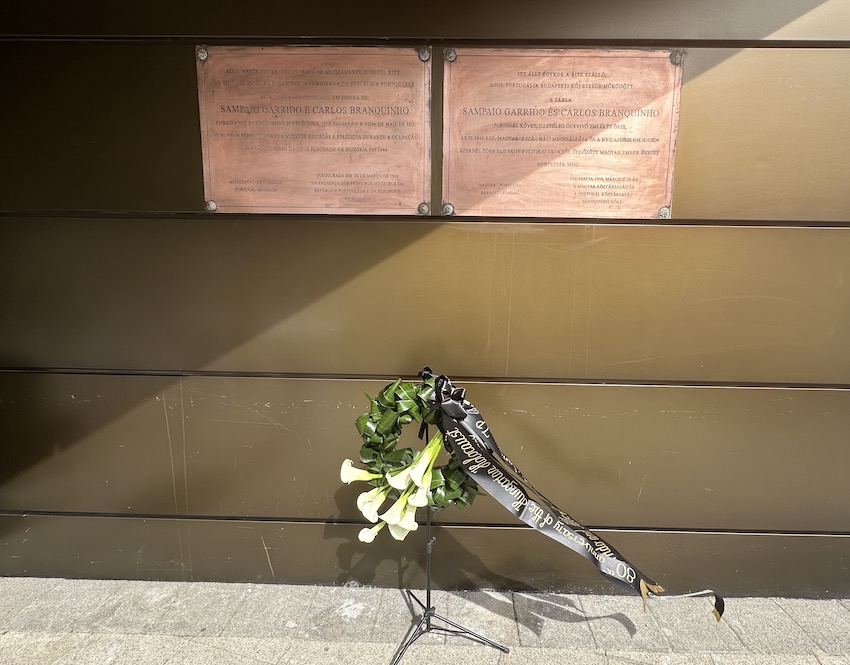
In his address, Ambassador Jorge Roza de Oliveira reflected on the historical actions of the Portuguese diplomats in Budapest during the darkest days of 1944, highlighting their courage and commitment at a time of great peril:
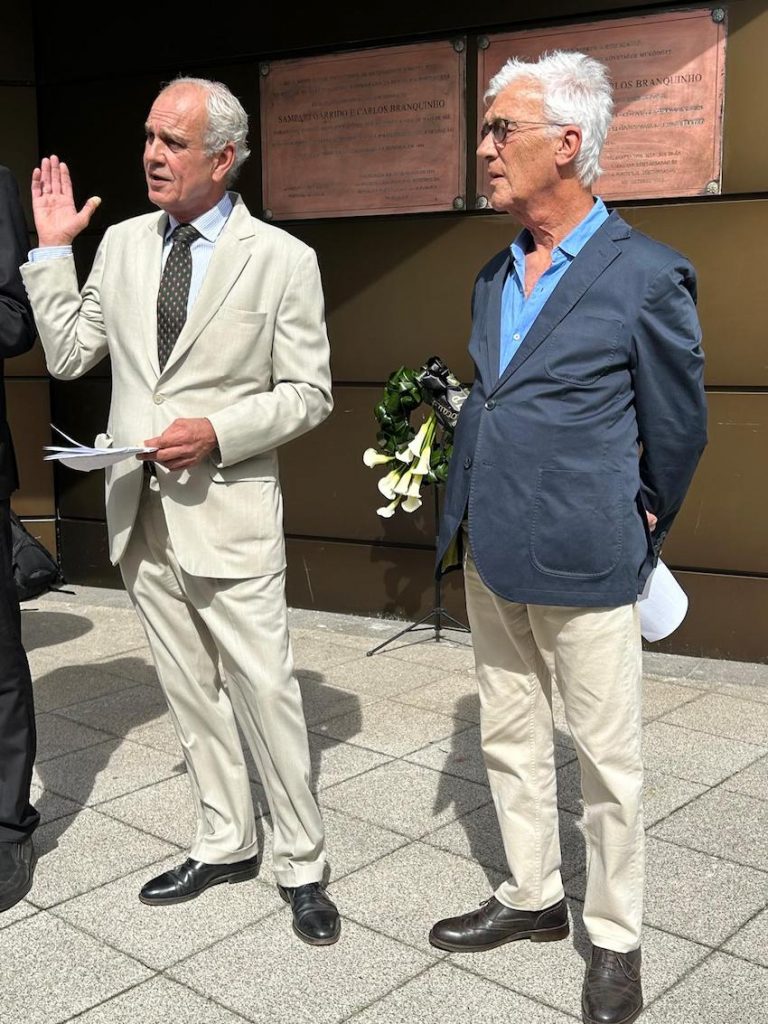
“Ladies and Gentlemen, Distinguished Guests,
Thank you for being here today to remember the Hungarian Holocaust, a horrific event that took place 80 years ago. Though it lasted only a few months, the death toll was devastating. Almost half a million Hungarian Jews – two-thirds of the community – perished. The lives lost, the families destroyed, and the community shattered weigh heavily on our hearts. We are also here to pay tribute to the Portuguese diplomats who showed immense bravery, helping to save hundreds of Hungarians from the horrors of the Holocaust.
You may wonder why we have gathered here, at this location – the InterContinental Hotel. I would like to take a moment to thank the hotel management for their gracious collaboration in making today possible.
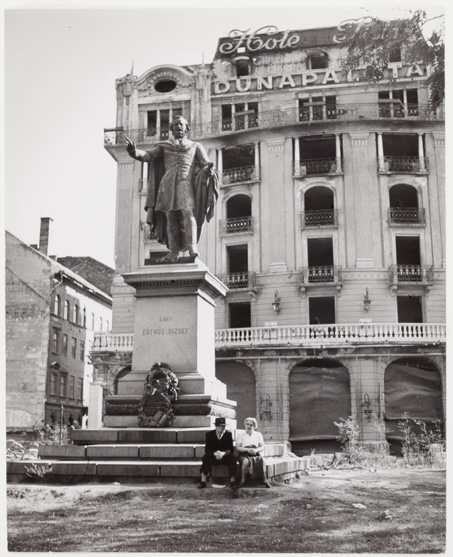
In 1944, another building stood on this very spot – the Ritz Dunapalota on the Danube bank. In 1945, it was hit by a Soviet bomb, burned for days and was eventually demolished two years later.
In 1944, our Portuguese Embassy was housed in a suite at the Ritz Hotel. It is a place of deep historical significance, and it is an honour to stand here today, so close to the Danube, where so many Hungarians tragically met their fate.
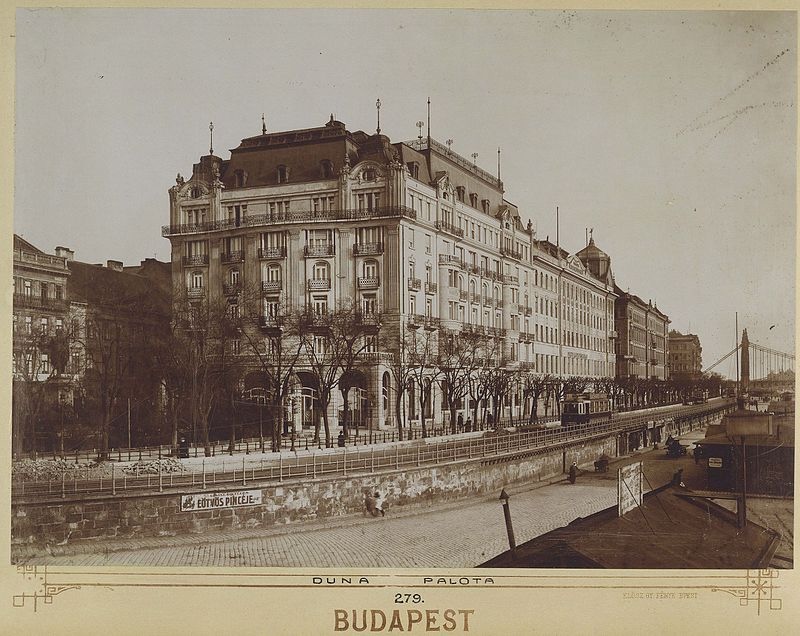
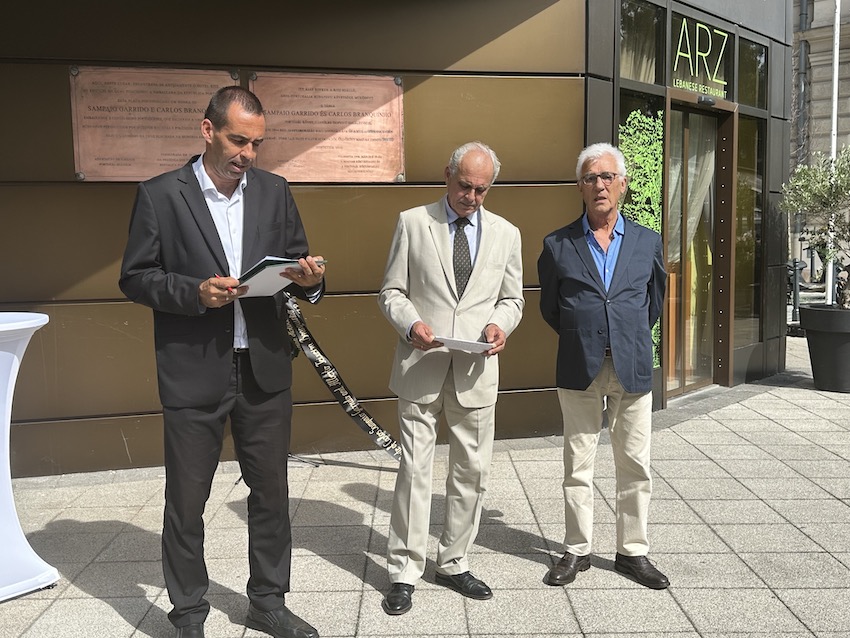
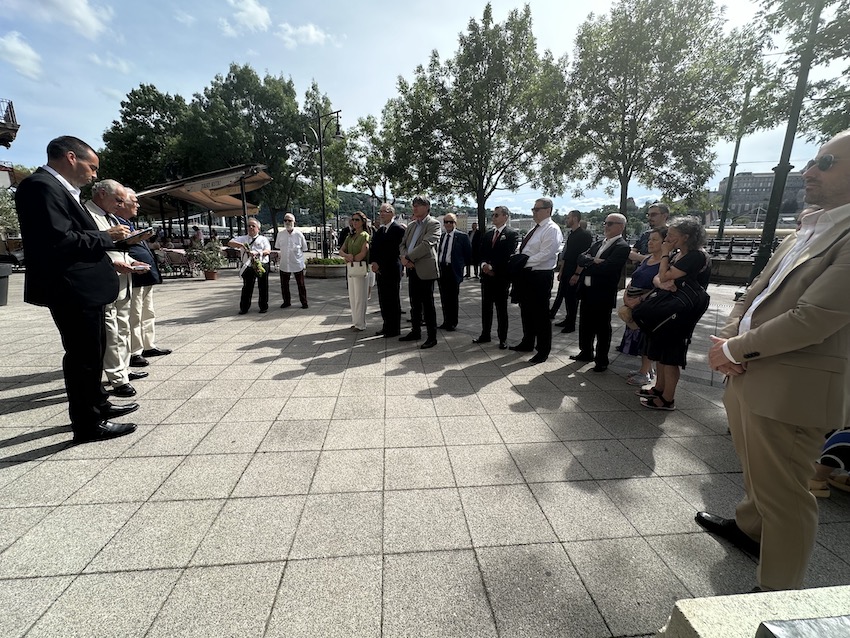
The memorial Shoes on the Danube, a sombre reminder of those times, is just less than a kilometre from here.
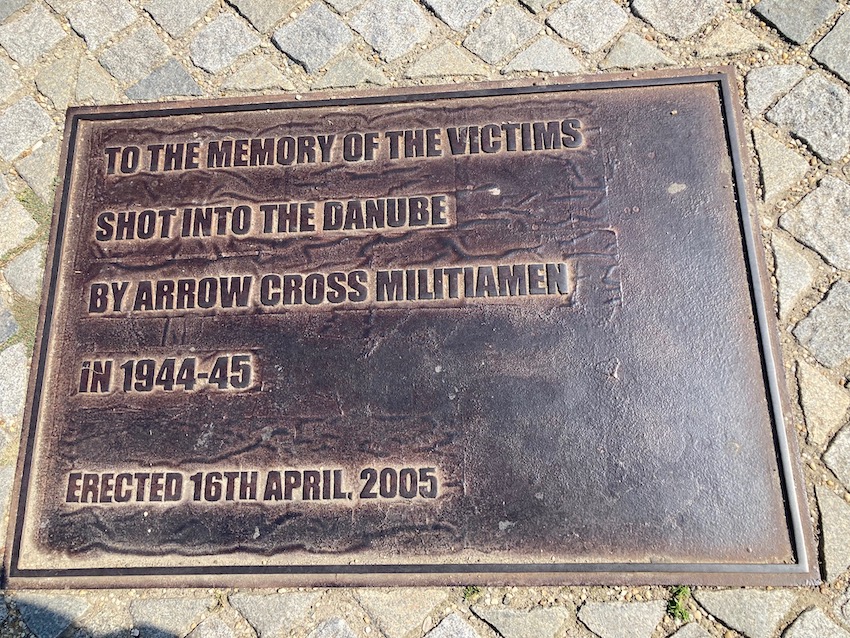
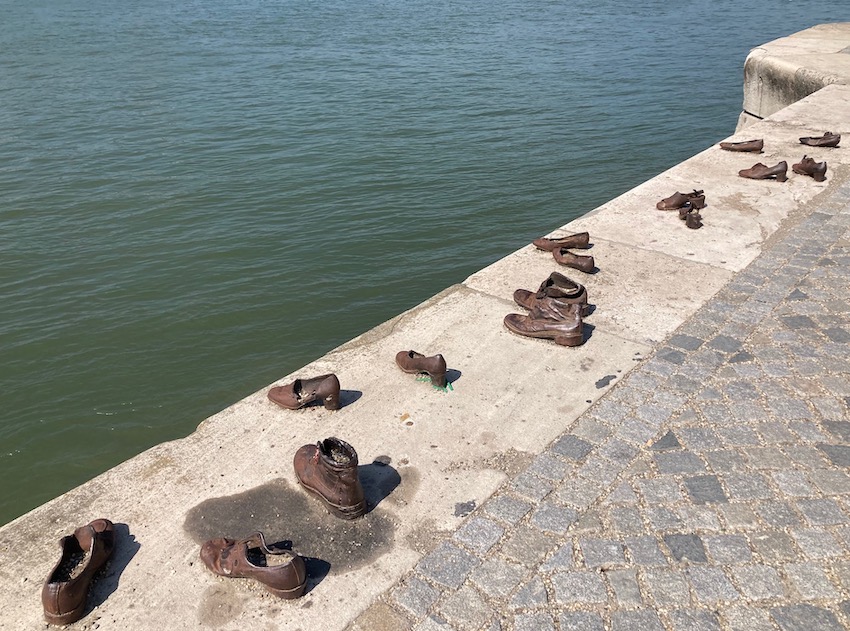
In 1998, these plaques were placed by then Prime Minister António Guterres, who is now the Secretary General of the United Nations. I had the privilege, as a junior diplomat, to assist in the preparation of that visit. It is a personal and professional honour to once again be involved in this remembrance.
Portugal, as you know, was neutral during WWII. When the Nazis invaded and occupied Hungary in March 1944, our Embassy was advised to temporarily leave Budapest. It moved to Galgagyörk, to the Castle of Tahy, an hour’s drive from here. Along with the Embassy staff, a group of Hungarian Jews fleeing Nazi persecution sought refuge there. But the safety was short-lived. After a month, the Hungarian Gestapo arrived and detained everyone, taking them back to Budapest. Our Ambassador, Carlos Sampaio Garrido bravely insisted on going with them. His courageous actions at the police station in Budapest, where he confronted Nazi officials, resulted in the release of all those detained.
This morning we paid tribute to Ambassador Sampaio Garrido in Galgagyörk, where his name will be forever honoured. I am delighted that his grandson, Salvador Sampaio Garrido Reis, is with us today. Salvador has dedicated his life to preserve his grandfather’s extraordinary legacy.

But Ambassador Sampaio Garrido was not alone in his bravery. His deputy in Budapest, Alberto Teixeira Branquinho, was equally resolute. After Sampaio Garrido was expelled from Hungary for his vocal defence of the Jewish community, Branquinho remained, continuing the life-saving work they had begun together. Between them, they saved hundreds of lives.
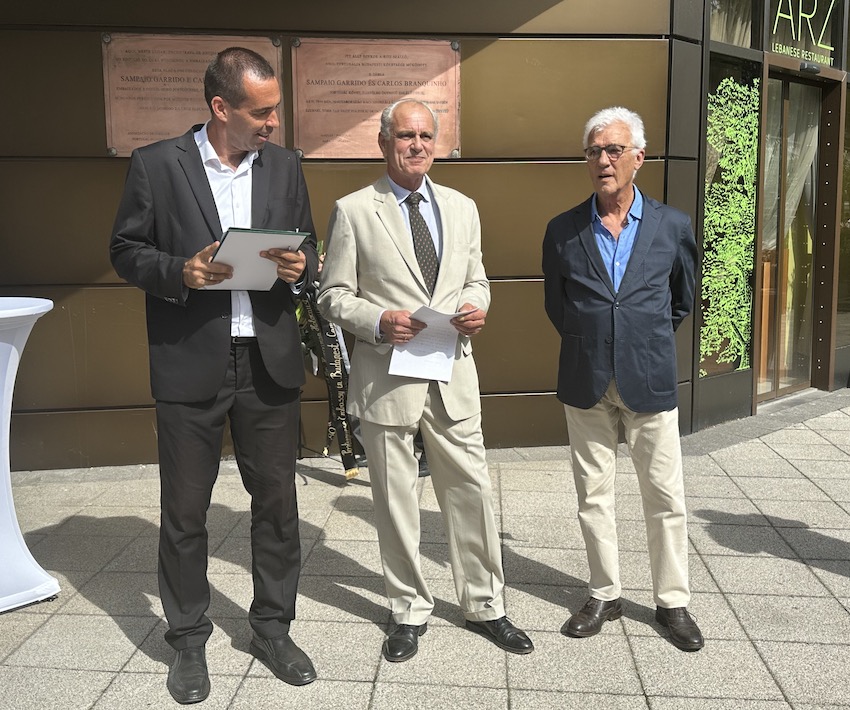
As we stand here today, let us also remember that antisemitism is not just a problem for the Jewish community – it is a problem for all of us.
As we witness a rise in antisemitism across Europe, we must continue to remember those who perished and honour those who risked everything to help. Their courage and sacrifice are a testament to the best of humanity. Let us never forget. Thank you.”
After the Ambassador’s speech the participants of the commemoration laid a wreath and flowers at the memorial plaques on the wall of Hotel InterContinental.
Visit of the Great Synagogue of Budapest
The Portuguese guests’ program included a visit to the Great Synagogue on Dohány Street, in the former Jewish quarter of Budapest. This iconic synagogue was completed in 1859 and witnessed tragic events during World War II when the Nazis turned the surrounding area into a Jewish ghetto, which later became a concentration camp.
In the garden of the synagogue stands the Holocaust Tree of Life Memorial, a weeping willow-shaped sculpture donated by the late American actor Tony Curtis, who was of Hungarian descent. Each leaf of this poignant memorial bears the name of a Hungarian Jewish martyr murdered during the Holocaust.

The Portuguese delegation also paid homage at a memorial dedicated to foreign diplomats recognized as Righteous Among the Nations. Among those honoured were Carlos Sampaio Garrido and Alberto Teixeira Branquinho, Portuguese diplomats who saved hundreds of Hungarian Jews during the war. The visit concluded with the laying of flowers at the symbolic tomb of these diplomats, whose names are inscribed as a lasting tribute.
Leaving stones or pebbles on a grave is an ancient Jewish tradition, symbol of the lasting nature of memory. Unlike flowers, which fade over time, stones endure, representing an eternal tribute to the deceased that will not wither or be forgotten.

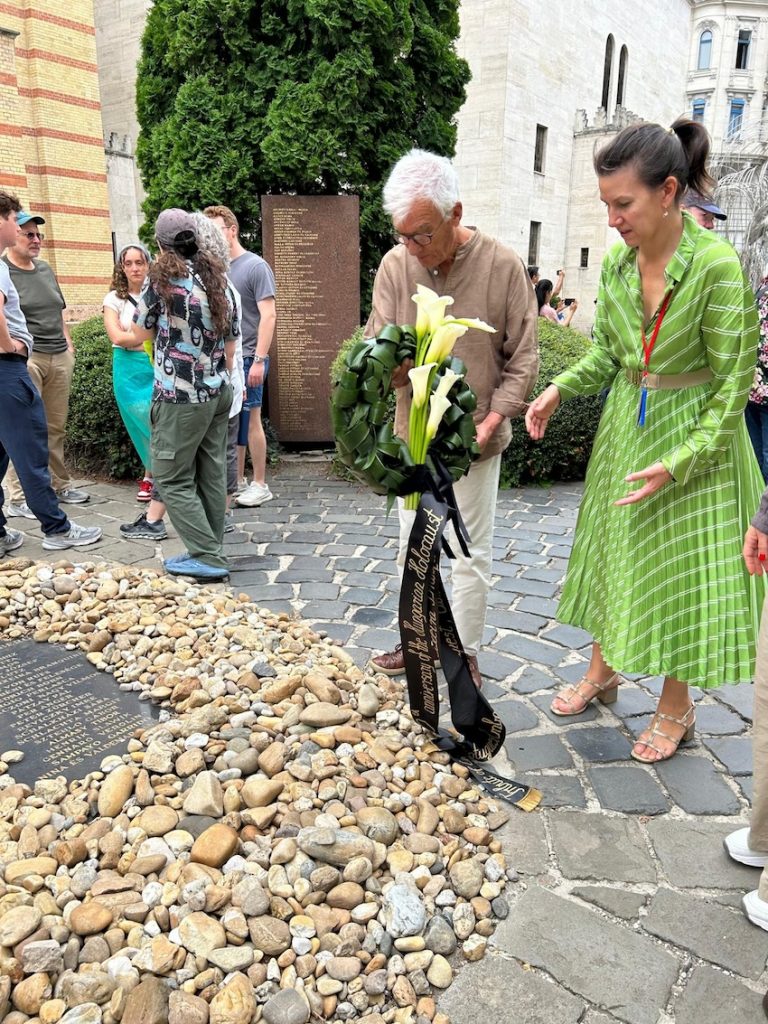
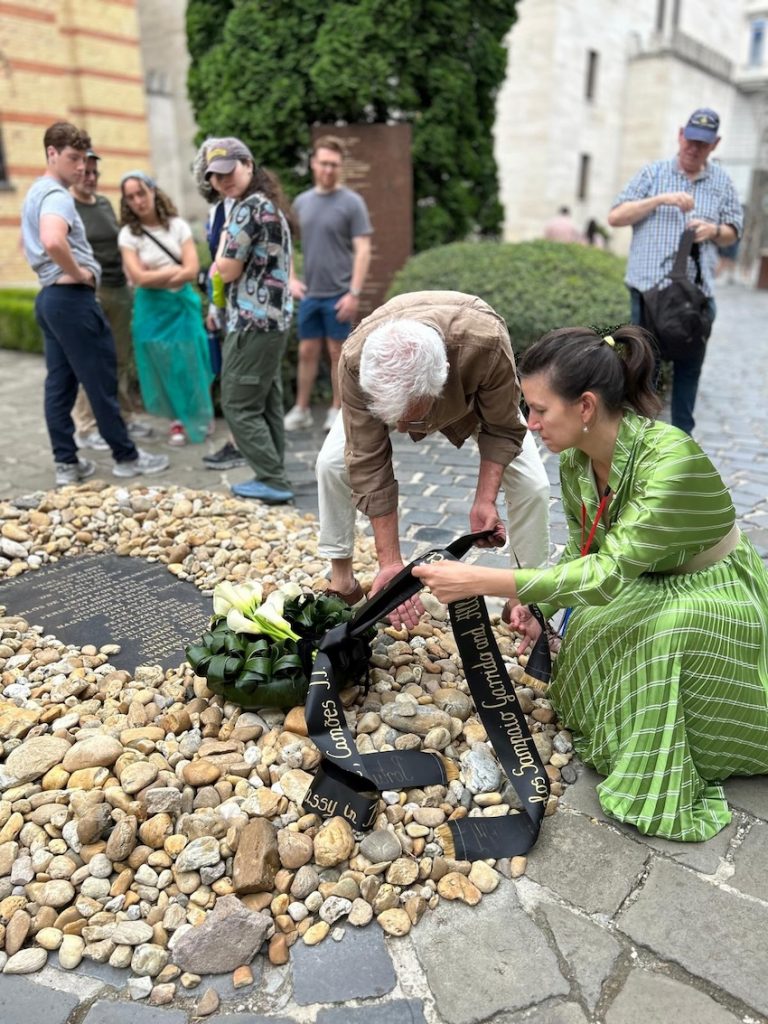
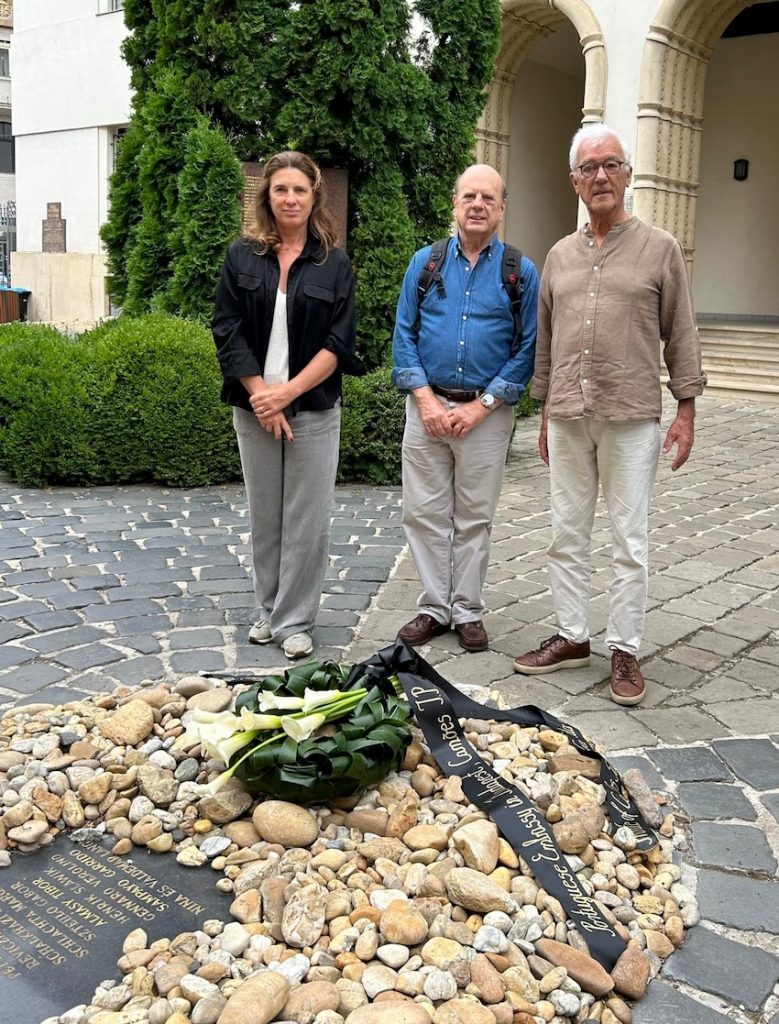
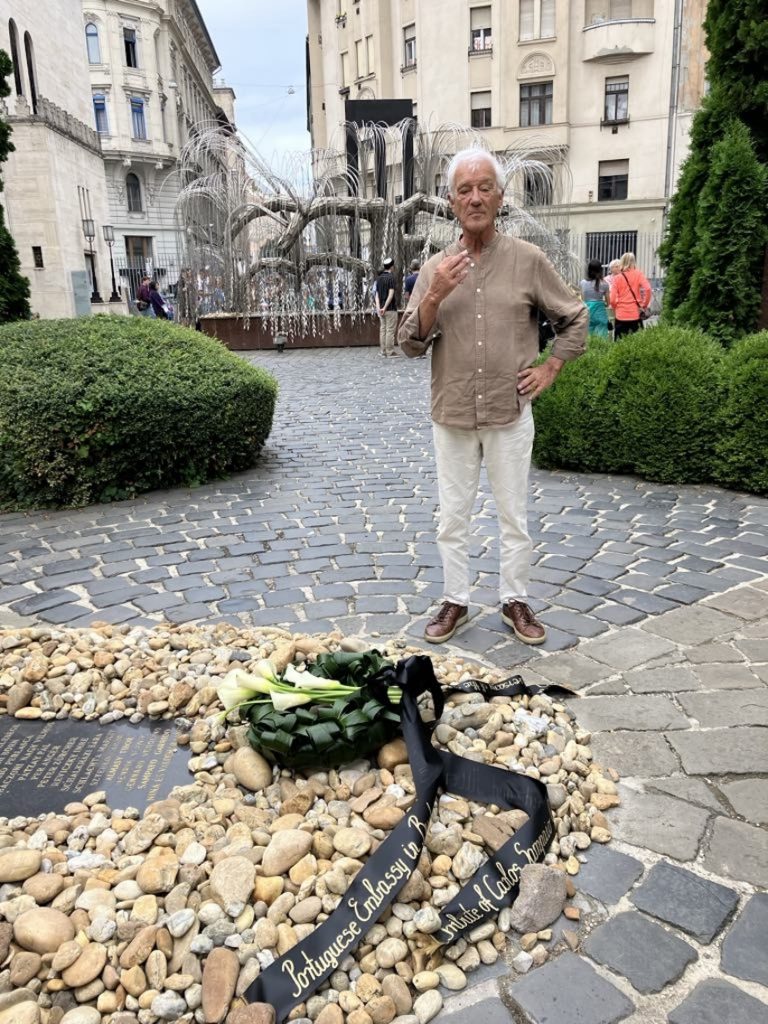
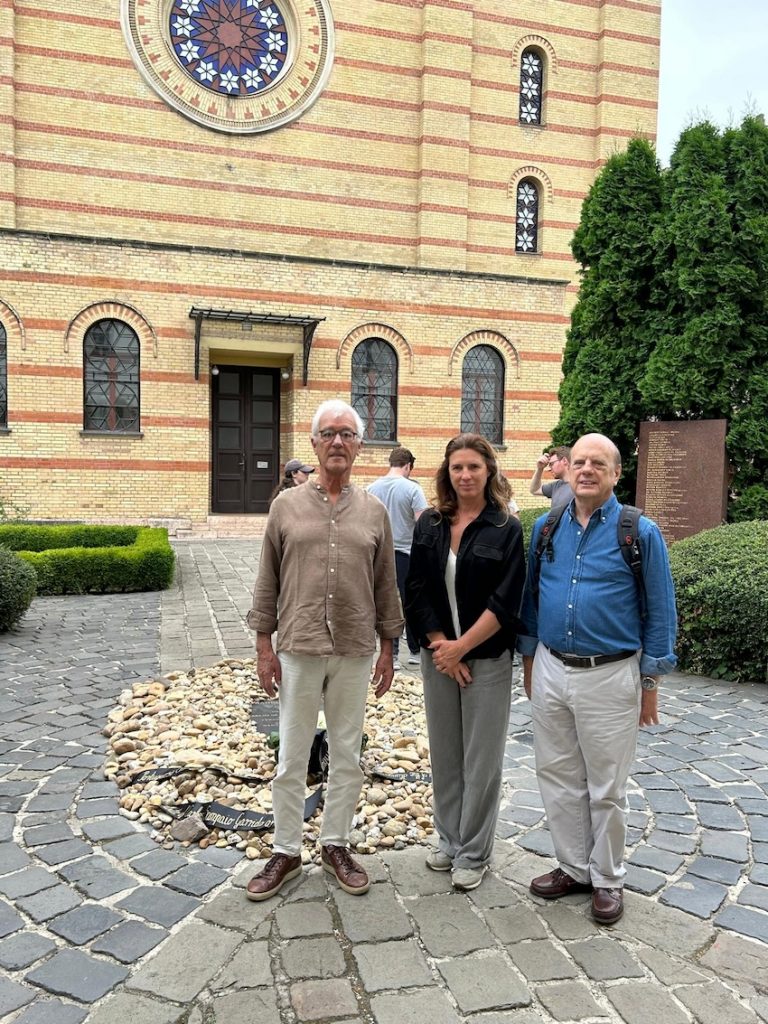
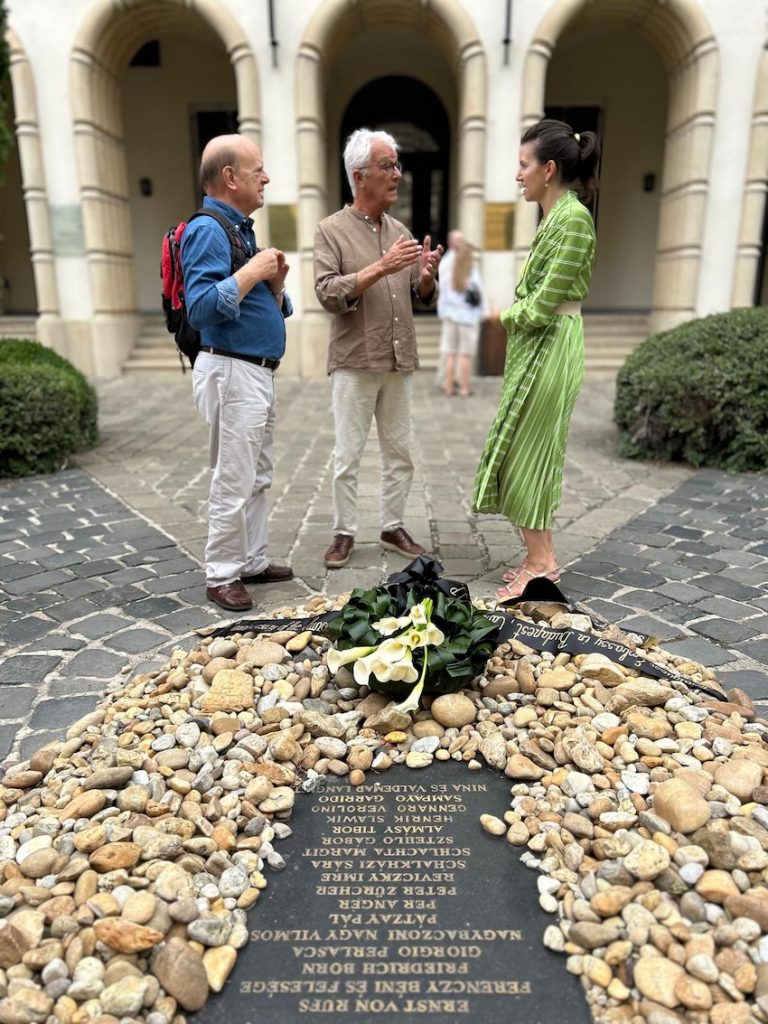
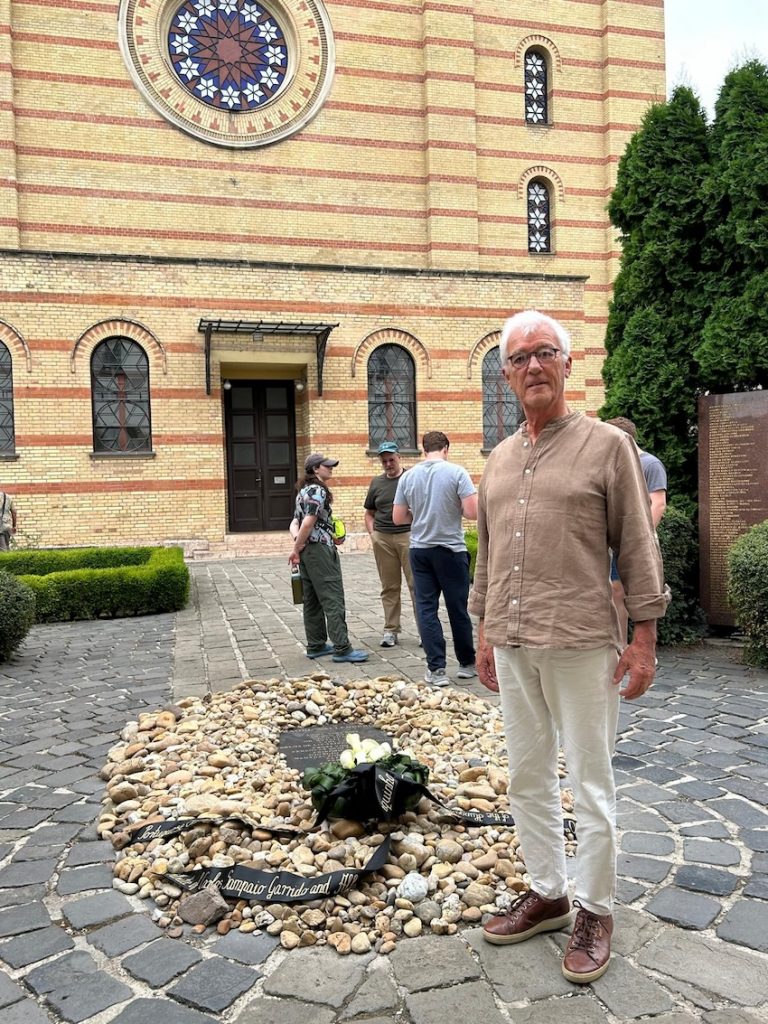

Visit to a Portuguese Protected House
The protected houses in Budapest provided diplomatic refuge to Jews during the Holocaust. In the summer of 1944, diplomats from neutral states accredited to Hungary placed numerous houses under their diplomatic protection. Although both the German and Hungarian authorities recognized the illegality of this action, they allowed it to continue, resulting in around 30,000 Jews finding shelter in these buildings in Pest. Many of those housed had protection certificates, passports or other – often forged – documents that temporarily shielded them from persecution.
One of the four houses, protected by the Portuguese Embassy, is located at Újpesti rakpart 5 in the 13th district of Budapest, one of the residential areas for Budapest’s Jewish community. A memorial plaque today commemorates the courage and humanitarian efforts of the Portuguese diplomats Carlos Sampaio Garrido and Alberto Teixeira Branquinho.
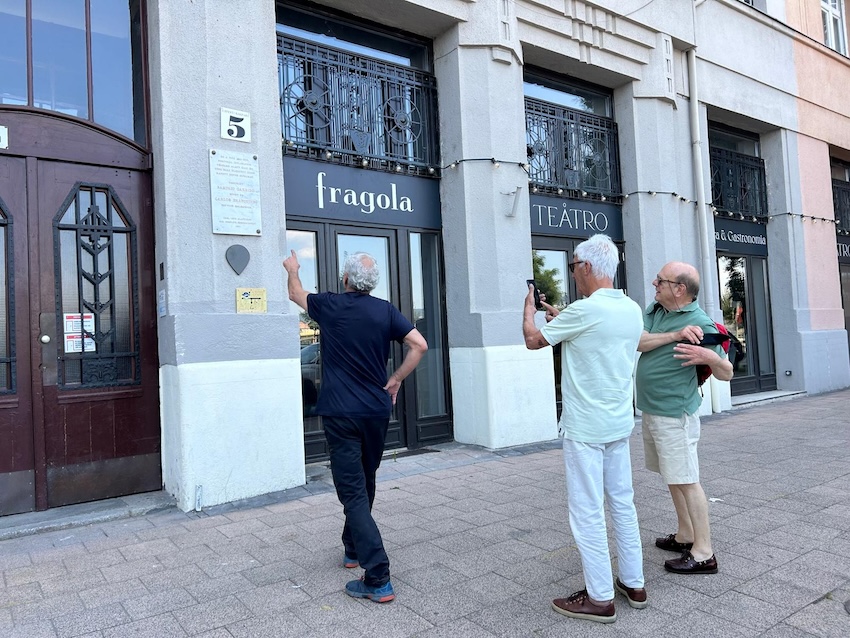
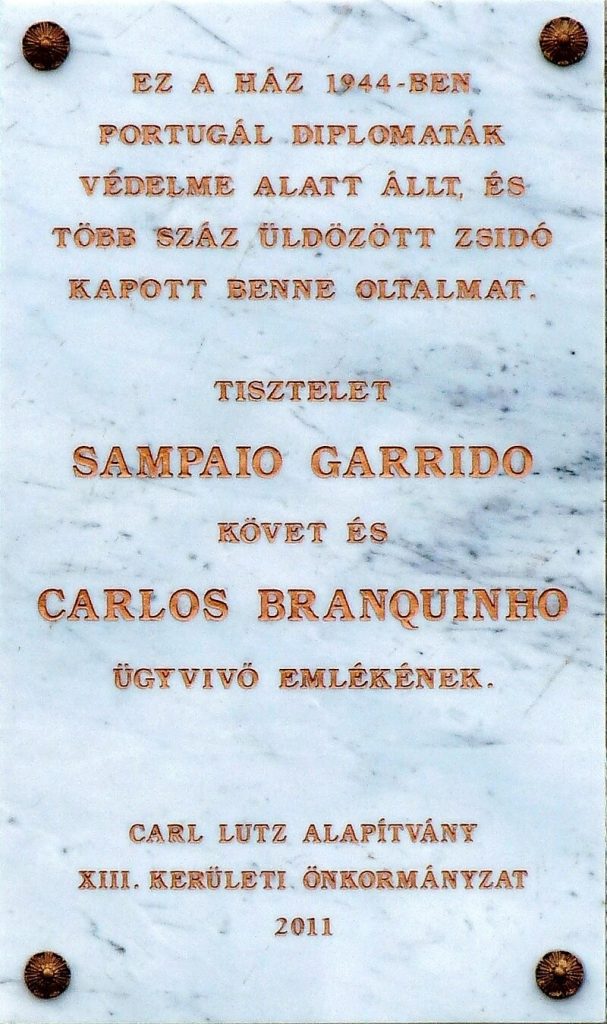
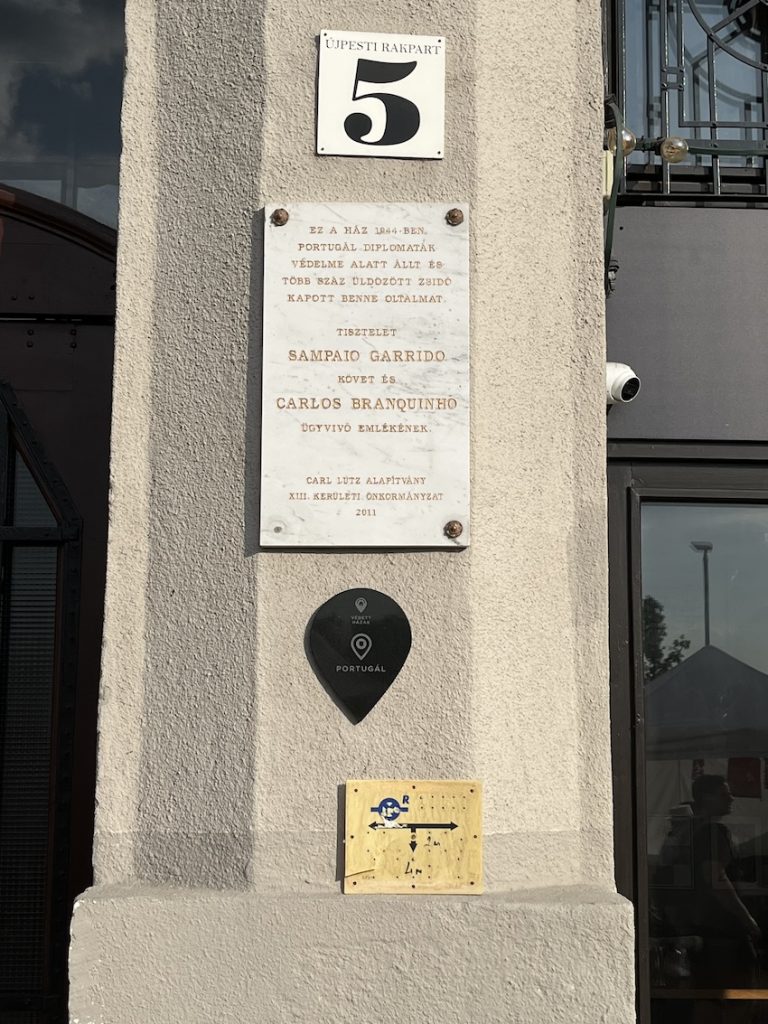
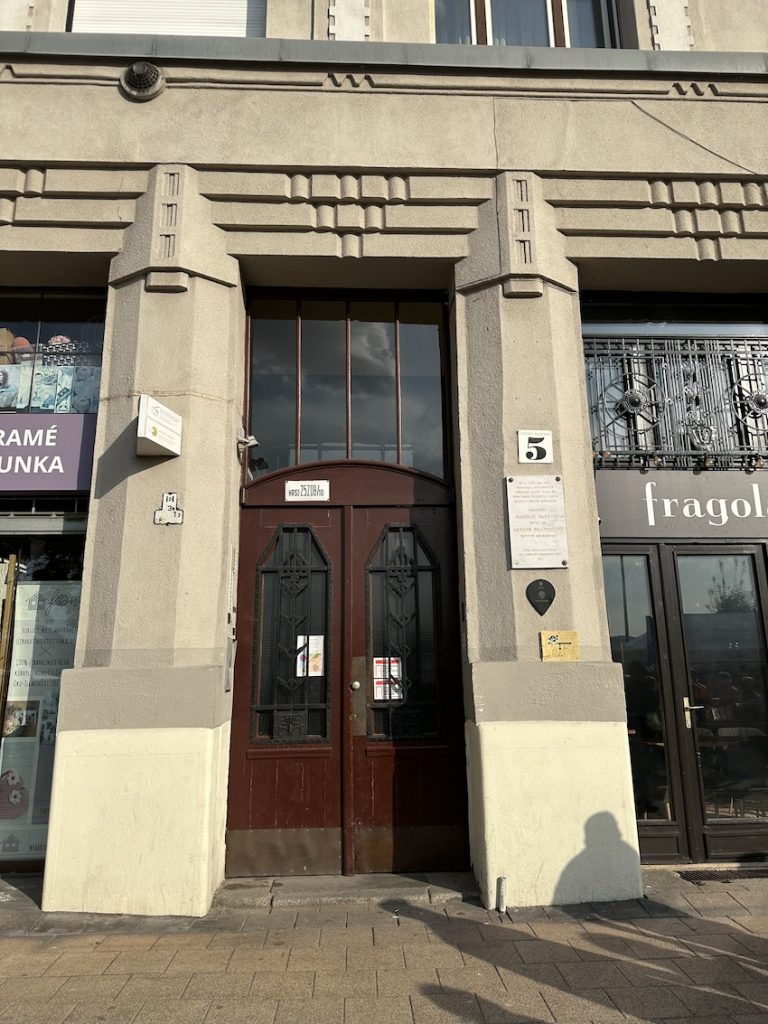
Initially, the protected houses were marked with a Star of David to signify their diplomatic protection. In the 2000s, black, teardrop-shaped plaques were placed on these houses to honour the memory of those who sought refuge there and to commemorate their historical significance.
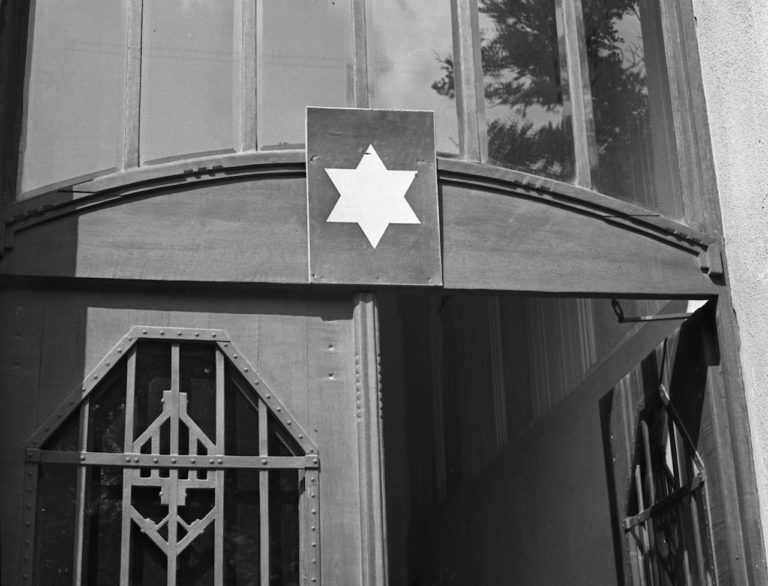
Memories of Salvador Sampaio Garrido Reis on his Grandfather
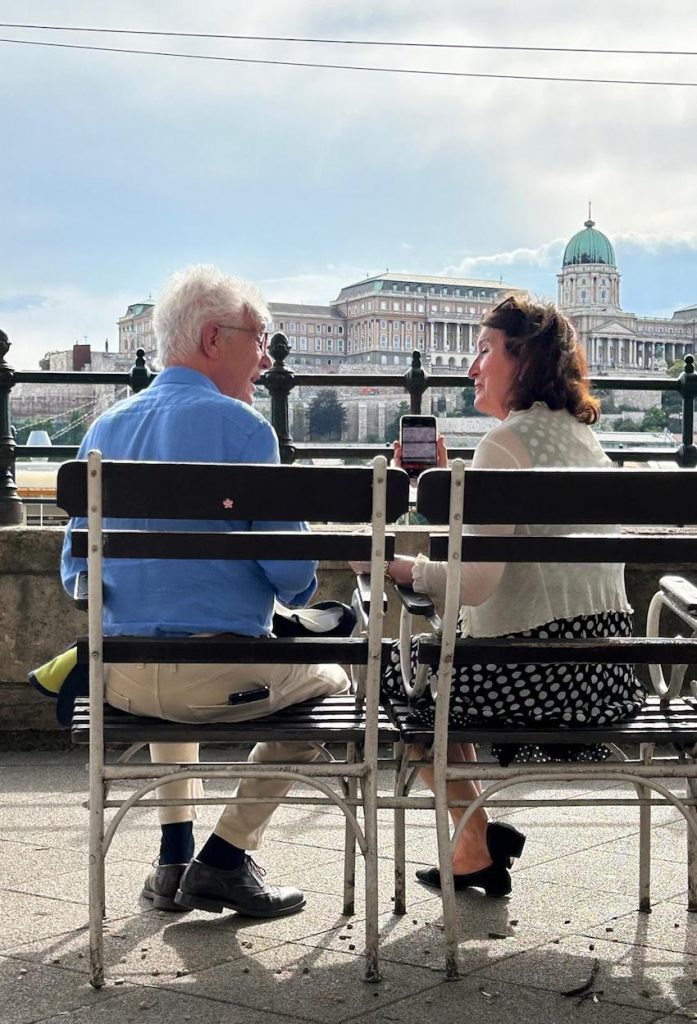
The entire day’s program had left us deeply moved and reflective. While sitting on a bench along the Danube promenade with the Portuguese guests, we gazed at the majestic river. I couldn’t help but think it was probably the same view that the late Ambassador Carlos Sampaio Garrido had from the suite of the Portuguese Embassy in the Hotel Ritz during his time in Budapest. So, I asked Salvador to share some personal memories of his grandfather. He began:
“I am very proud of my grandfather, Carlos Sampaio Garrido. He was born in 1883, graduated in Economics and Financial Sciences, and entered the Portuguese Diplomatic Service at a very young age. He enjoyed a long and distinguished diplomatic career, serving in various missions. Before being posted to Budapest as ambassador in 1939, he was and experienced diplomat, having held positions such as consul in Porto Alegre, Bahia, Rio de Janeiro, and São Paulo in Brazil. He also served as consul general in Rio de Janeiro and Paris, as well as extraordinary envoy and minister plenipotentiary to Stockholm and Buenos Aires. After World War II, in December 1945, he was once again appointed extraordinary envoy and minister plenipotentiary to Stockholm, Sweden.
I was 9 years old when he died in 1960. I lived with my parents in Sintra but often visited him at his beloved home in Estoril. I remember walking with him a lot; he was a very dear old man, close to my heart. He never spoke about his time in Hungary, but my mother and uncles often discussed it. I believe he chose not to talk about the war because it had traumatized him so deeply. He preferred not to recall those horrible times. As a result, my family had little knowledge of or access to the official documents now held in the Ministry of Foreign Affairs.” Salvador’s words reflected his grandfather’s emotional burden and the unspoken pain left behind by his experiences during the war. Salvador continued:
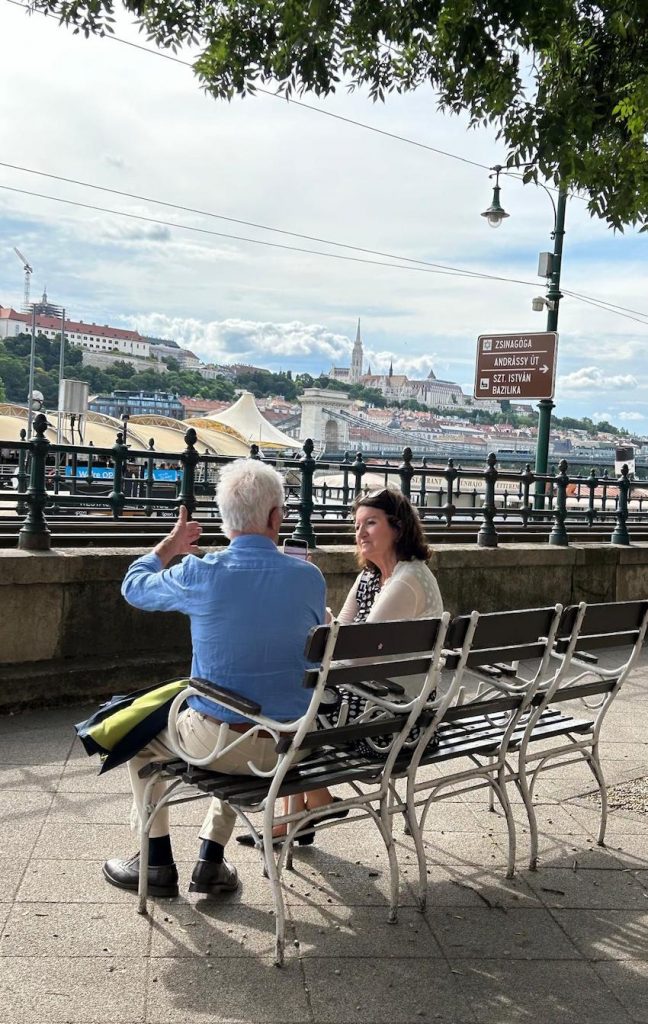
“Later, I became the spokesperson for my family regarding my grandfather’s remarkable history. In 1994, (34 years after my grandfather’s death) I had a particularly memorable experience while visiting the Hungarian Embassy in Lisbon for professional reasons. As I was admiring the Herend porcelain on display at the embassy, a man approached and asked if I liked the pieces. I mentioned that I had similar items at home that my grandfather had brought from Hungary when he served as ambassador there during the war. Intrigued, the man asked my name and to my surprise, he introduced himself as Dr. András Gulyás, the Hungarian Ambassador.
Ambassador Gulyás was thrilled to discover that he had by chance met a descendant of the Carlos Sampaio Garrido family, whom the Hungarian government had been trying to locate. He explained that the Hungarian Ministry of Foreign Affairs wished to honour my grandfather for his courageous efforts in saving Hungarian Jews during the Holocaust.
Ambassador Gulyás had read the work of Dr. Éva Bán, a Holocaust survivor and Hungarian historian, along with Portuguese researcher António Loução Carlos de Almeida Alfonseca. Their studies revealed the life-saving efforts of Portuguese diplomats Carlos Sampaio Garrido and Alberto Carlos de Liz-Teixeira Branquinho, whose wartime activities had been largely unknown in both Hungary and Portugal.
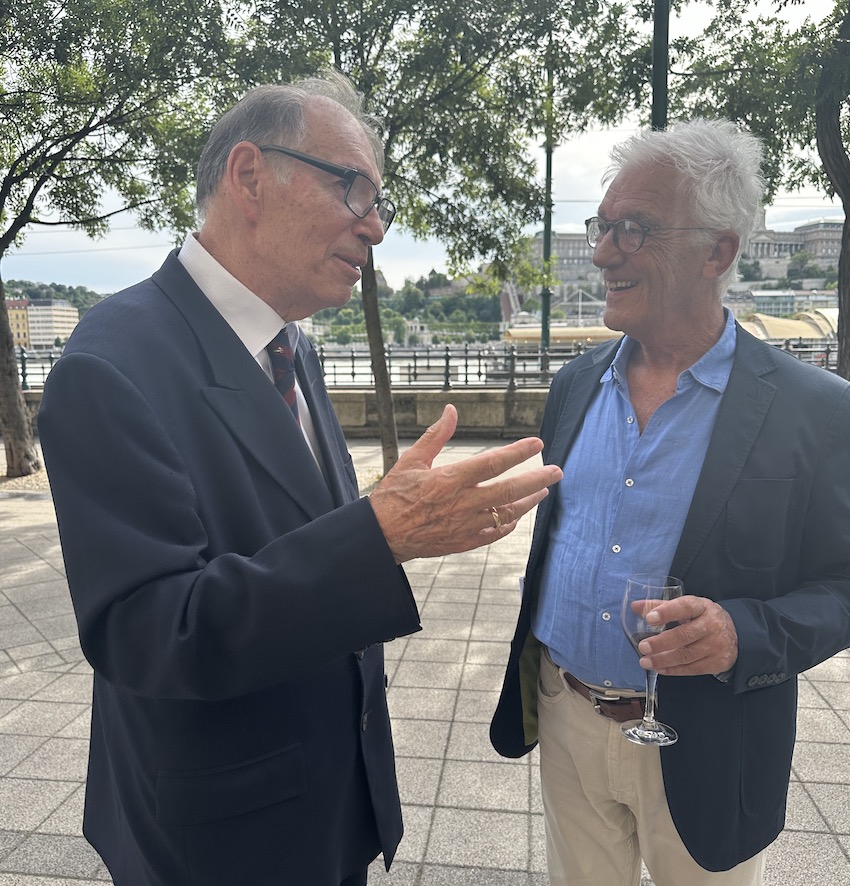
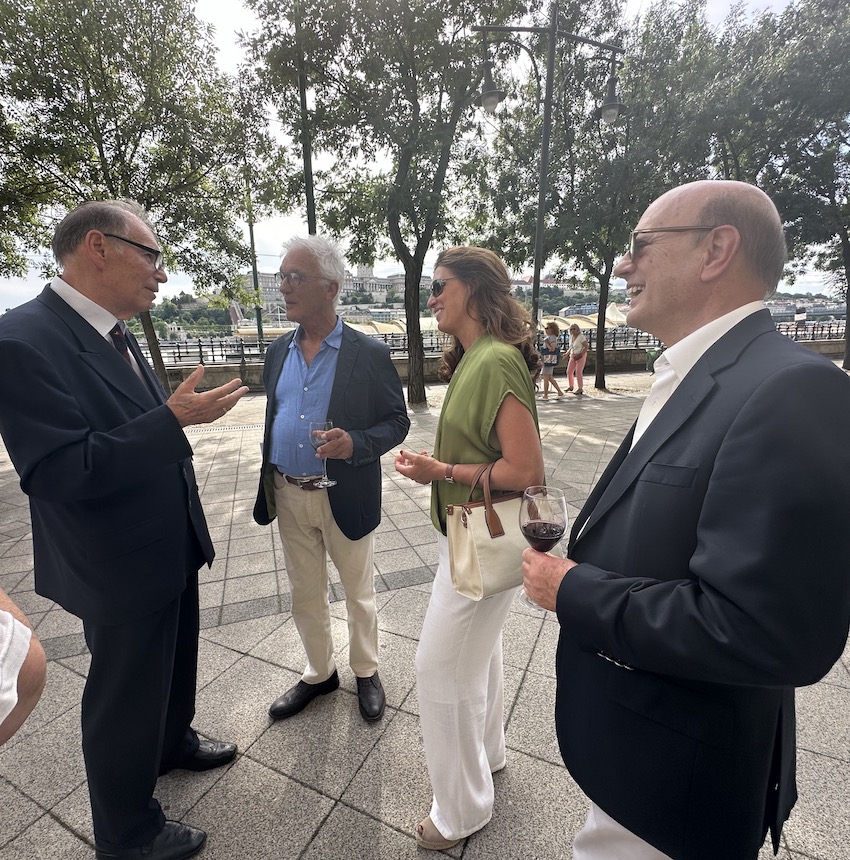
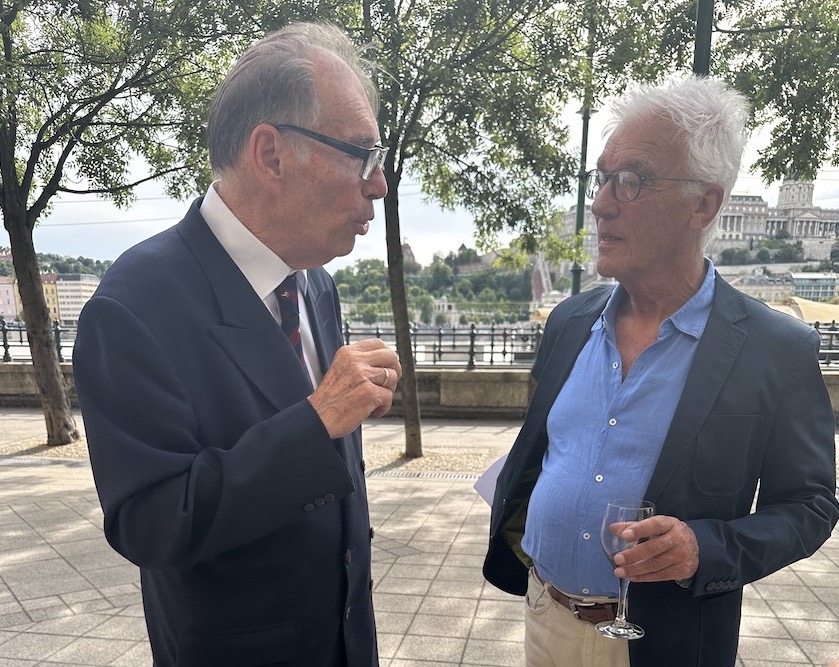
On 20 June 1995, I attended a deeply moving ceremony at the Hungarian Embassy in Lisbon, where my grandfather was officially honoured for the first time, on the recommendation of Ambassador Gulyás. On behalf of the then President of the Republic of Hungary, Árpád Göncz, Ambassador András Gulyás posthumously presented the ‘Gold Medal of the President of the Hungarian Republic’ to both Carlos Sampaio Garrido and Alberto Carlos de Liz-Teixeira Branquinho for their selfless and devoted efforts, who were acting according to the dictates of their conscience and generosity of their nature during the Holocaust in Hungary.
The ceremony took place in the presence of the two diplomats’ family members and the then Portuguese President Mário Soares, and was widely covered in the Portuguese media, including TV channels and daily newspapers.
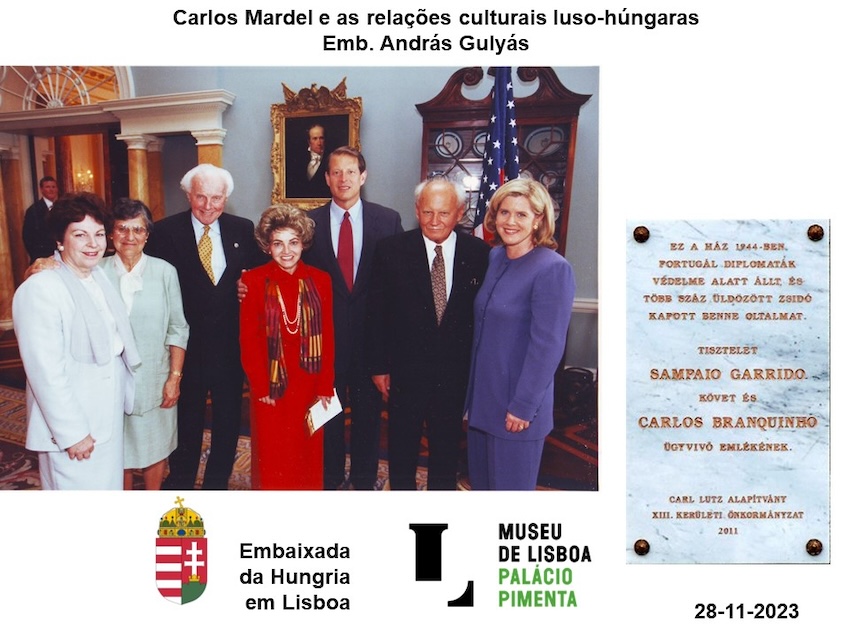
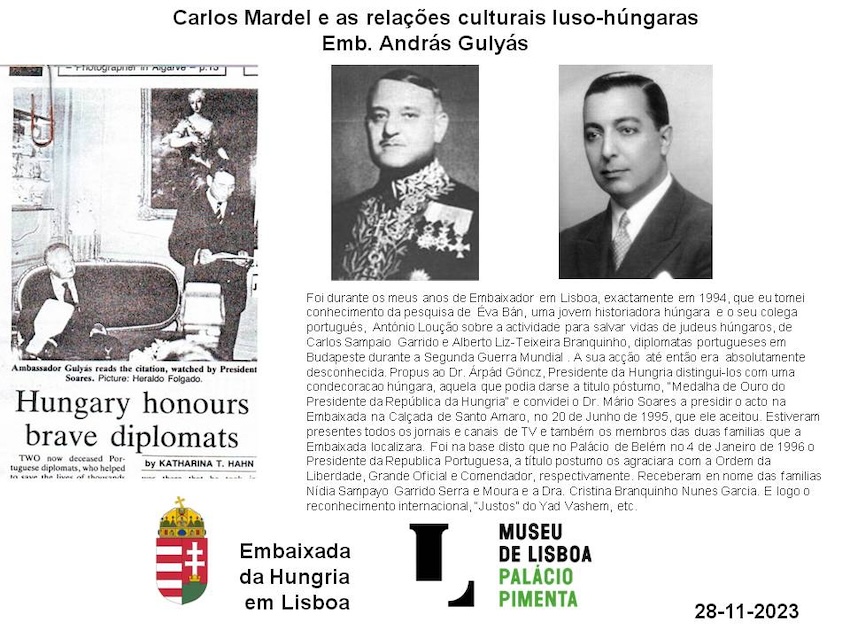
I do my utmost to preserve and honour the legacy of my grandfather. We have access to a collection of documents detailing his activities during his five-year mission in Hungary, a pivotal and turbulent period in history. These papers are a testament to his courage and dedication, especially during those critical years.
Upon my return home, I plan to document everything that has transpired here in Budapest during these days of commemoration, reflecting on his brave actions. I share his story with my children, my grandchildren, and my entire family. It is vital that his memory lives on, that his example of strength and humanity is never forgotten. Ensuring that future generations remember what happened during the Holocaust is not just a duty, but a moral responsibility. His story must serve as a beacon, reminding us of the horrors of the past and inspiring people to uphold justice, compassion and courage. I am committed to this task, so that the lessons of history are never lost, and his extraordinary legacy continues to inspire.”
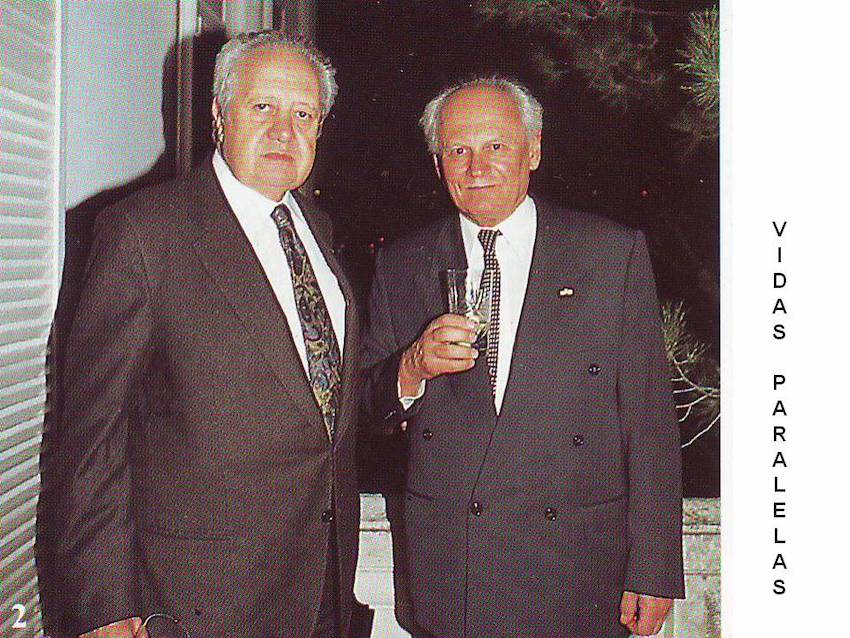
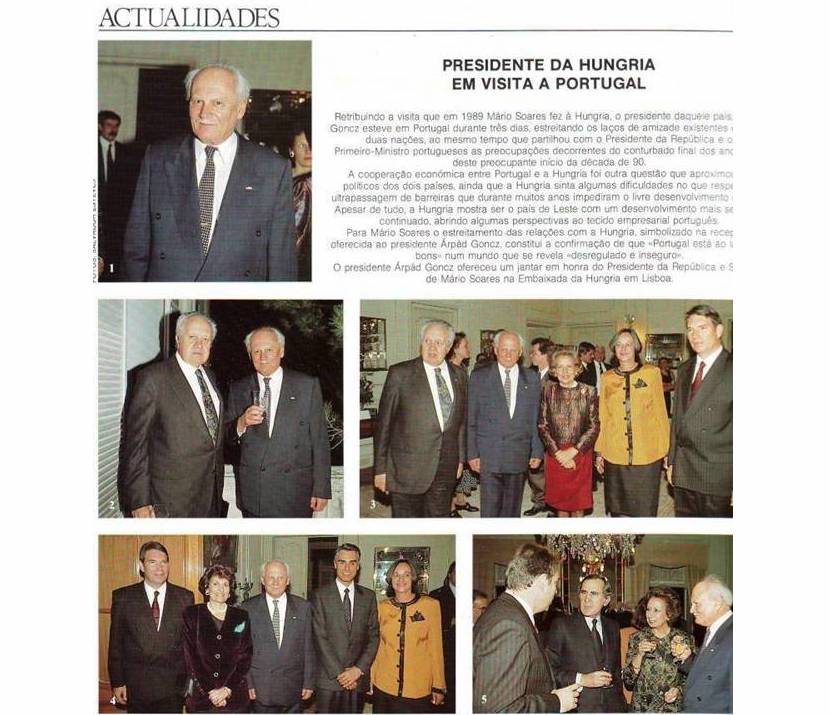
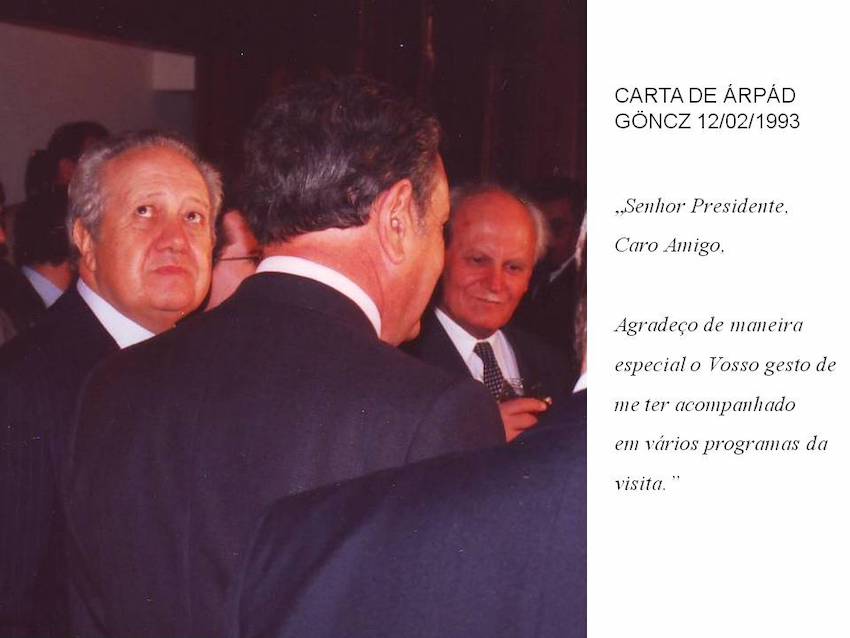
Following the recognition in 1995 by Hungary, the President of Portugal awarded both diplomats the prestigious ranks of Commander and Chief Officer of the Order of Portuguese Freedom on 4 January 1996. And in 2010, their contributions were internationally recognized posthumously by Israel, when they were bestowed the title of ‘Righteous Among the Nations’ by Yad Vashem in Jerusalem.
During the Holocaust, the Portuguese Embassy in Hungary played a crucial role in saving the lives of around a thousand individuals, primarily Jews. Over 700 of them were provided with temporary Portuguese passports that allowed them to escape persecution.
Notably, among those saved by the Portuguese diplomats were the family of Annette Tillemann Lantos, wife of Hungarian-born U.S. Congressman Tom Lantos, the only Holocaust survivor to serve in the U.S. Congress from 1981 to 2008 (D-California). Anette and Tom Lantos turned their painful past into a powerful, lifelong commitment to human rights, dedicating themselves to protecting minorities and promoting human dignity across the globe. Their enduring legacy continues through the Tom Lantos Institute in Budapest, Hungary.

The Gábor family, renowned for the famous three sisters – Zsa Zsa (born Sári), Magda and Éva Gábor – along with their mother, Jolie, were also rescued by Portuguese diplomats, alongside their cousin, the 13-year-old Annette. The Hungarian-American actresses and socialites relocated to the United States, where they aspired to launch their film careers.
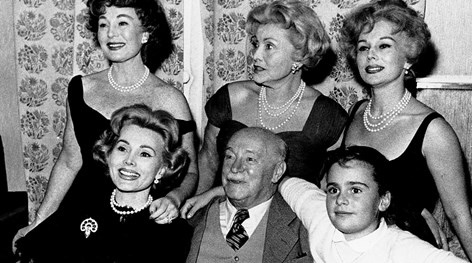
The Hungarian sociologist and historian Péter Kende, who later became famous as a French citizen, also gained accessed to Portuguese documents through his uncle in Brazil.
In addition, Baron Manfred Weiss, a Jewish industrialist and owner of Hungary’s largest factory, the Csepel Steel and Metal Works, also found refuge in Portugal with his extended family.
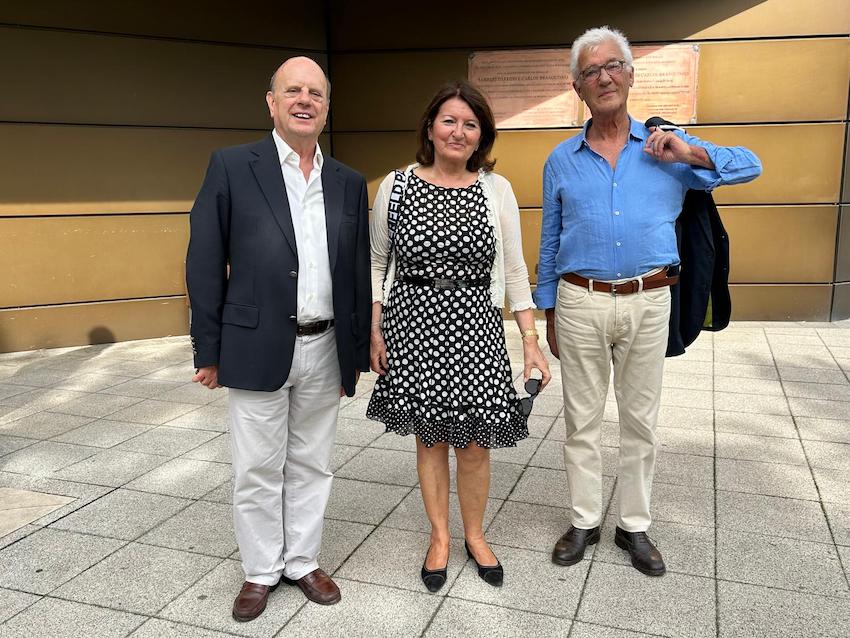
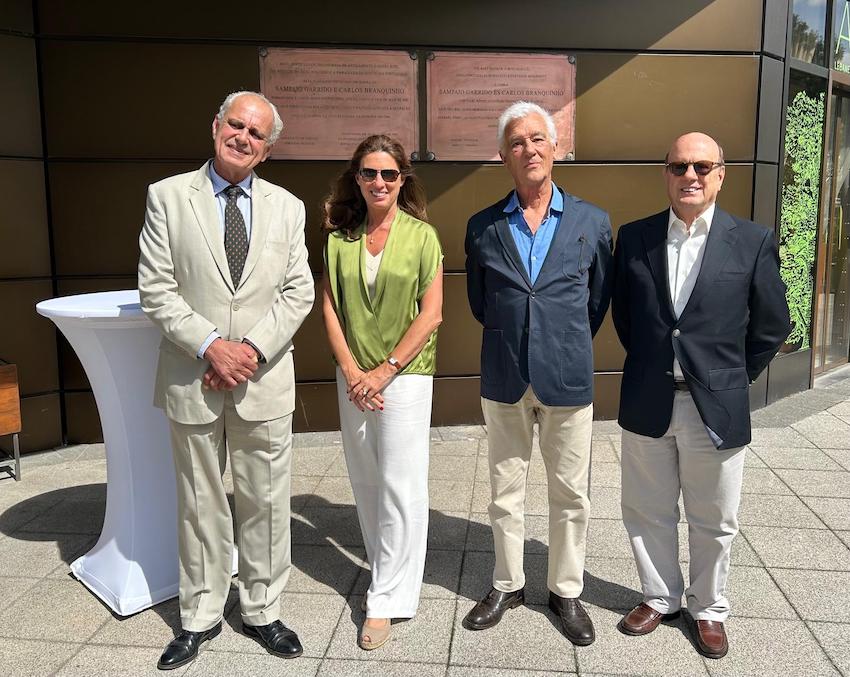
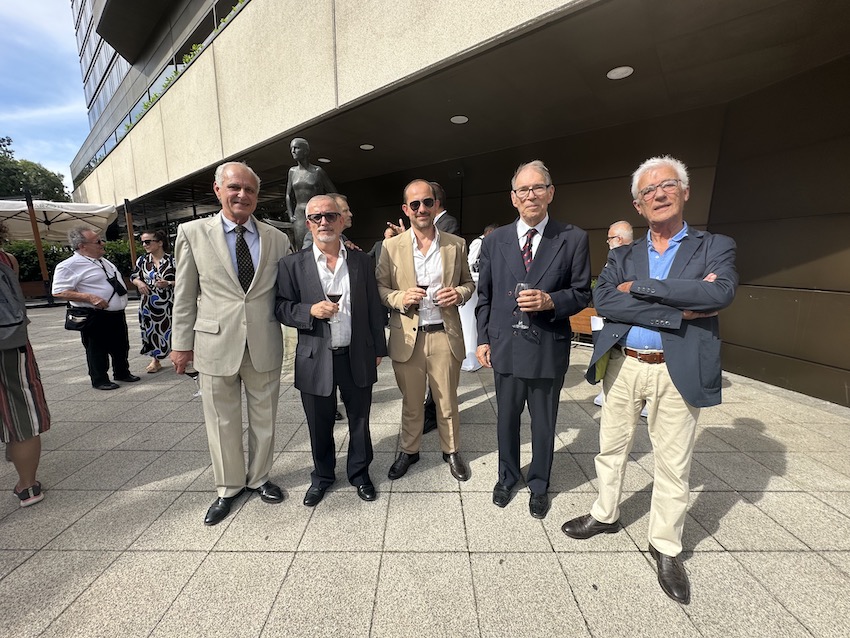
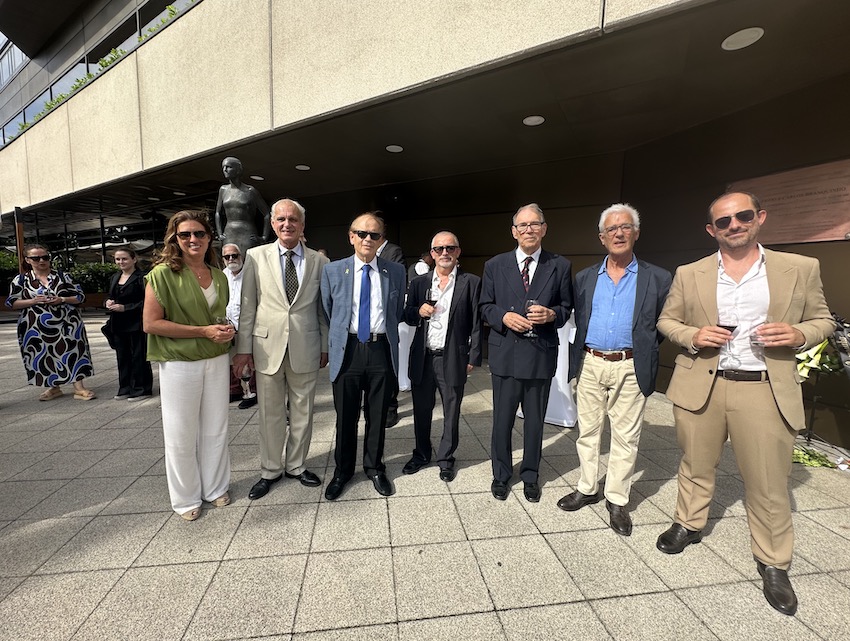
Source: Embassy of Portugal in Budapest, archive of Ambassador András Gulyás
Photos by the Embassy of Portugal in Budapest, Amb. Dr András Gulyás and DPA





